Details of where your donations go
Previous Projects
Here is what you helped with your support in previous years:
2023 Projects
The money raised by Radio Cracker Ballymena in 2023 was £38,700 and went to the following causes
- Samaritan’s Purse: for biosand water filters in Cambodia
- Fields of Life: for a borehole in a village in Northern Uganda
- Mulyata: Solar panels for a children’s mission in Zambia
- Smiles Foundation: RCB will sponsor a medical treatment room in Romania
- Care for Cambodia: Classroom equipment
- Spud Bear: Mattresses for 200 children in a home in Uganda
- B.R.E.A.D: 15 water tanks for homes in Kenya
2022 Projects
The money raised by Radio Cracker Ballymena in 2022 was £51,021 and went to the following causes
- £3,003 for Samaritan's Purse to purchase 21 sewing machines as part of SP Safe Haven project for vulnerable women in DR Congo.
- £6,000 for Kids 4 School to supply 120 bicycles to support schoolchildren in rural Tanzania to continue their education
- £8,550 to Fields of Life to build a borehole in Uganda to bring hope to an entire community of around 500+ people by giving them access to clean water and sanitation.
- Second Sight carry out amazing work in India by carrying out cataract removal operations. This year we are giving them £6,000 to fund approx 300 operations
- £5,400 goes to BREAD to allow them to install a further 36 rainwater collecting tanks for the Tharaka people in Kenya
- £8,418 to EMMS International to provide clean water at Mulomba and Thembe Health Centres in Malawi. Imagine a health centre with no clean water!!!
- £8,000 to E3 to purchase a tractor for a community in Zimbabwe. This tractor will give c600 families the ability to plant more crops and give them food security
- £5,400 to Mulayta to erect a security fence & build a guard hut around their hygiene station in Zambia.
- Mission Africa will receive £250 for mosquito nets in addition to the 14 mosquito nets sold through our Alternative Gifts initiative in the shop.
2021 Projects
Due to Covid there was no FM or online broadcast in 2021, but we were able to run a recording studio in Ballymena and publish prerecorded shows online, and we had a stream of music playing through street speakers in Ballymena town centre. This along with our arts and crafts allowed us to raise just over £20,000 which was distributed as follows:
- £3,000 for Samaritans Purse towards community latrines which will serve 8 communities and help around 4,000 people in Ethiopia.
- £1,500 for Kids4School for 'modesty packs' of 2 pair of pants and a pair of tights in Tanzania.
- £2,402 for Fields of Life to buy a rainwater harvesting tank for a school in Uganda.
- £3,000 for Second Sight for 200 cataract operations in Bihar State in India.
- £3,086 for EMMS International for 2 vital signs monitors in Mulanje Mission Hospital in Malawi.
- £3,000 for BREAD for Kenya to supply 20 rainwater tanks for the people of Tharaka in Kenya.
- £1,750 for Spud Bears to purchase 10 animatronic talking bears to educate children on the dangers of unexploded bombs in Laos.
- £1,200 for Care for Cambodia towards whiteboards, tarpaulins and water filters.
- £1,200 for Tearfund towards weatherproof seed packs in Uganda. (£4 per family)
2020 Projects
With Covid restrictions, we were not able to run a studio or shop, but we were able to host prerecorded shows online, allowing us to raise £13,500, distributed to the following projects:
Mission Africa reports that deaths due to COVID-19 were not as terrible as anticipated but the lockdowns have been utterly devastating to communities. Many people in urban areas rely upon day to day casual jobs, whilst the rural population rely upon agriculture -which requires daily work in the fields. Lockdowns that require these vulnerable parts of the population to stay at home have caused economic devastation. Starvation has become a reality, as fields are untended and wages disappear. Aid distribution has already saved the lives of some people close to starvation.
We are donating £2,000 to Mission Africa to help supply food, soap and hand sanitizer to those who need it most.
Kids4School report when Tanzania was affected with COVID-19 in March 2020, they did what they could to provide gloves, masks, hand gel and hand washing facilities to as many as possible. Due to lack of finances, many people were not in a position to get PPE for their family and were left hitting the virus head on, with no protection.Covid has now been announced again in Tanzania and the government are asking people to start using the PPE again.
We are donating £1,000 to supply as many homes as possible with a ‘love gift’ containing masks, gloves, hand gel, soap and a small Swahili Bible. This will at least give these families a chance to protect their loved ones.
Second Sight - For most of 2020 Dr Samuel Murmu was away from Bamdah Christian Mission Hospital due to travel restrictions, but was able to conduct telemedicine consultations with the trained ophthalmic staff there. Bamdah and other Second Sight partners were the only eye hospitals able to stay open in Bihar showing enormous initiative in sourcing PPE, testing patients and implementing social distancing and other necessary safety protocols.
Blindness compounds the dire poverty that COVID-19 has worsened and so we are donating £3,000 to Second Sight to help fund the PPE for their hospitals so that the sight-giving operations can continue.
Bread for Kenya - As you know from the health campaigns in Northern Ireland hand washing is an essential step in defeating COVID-19. This is not always easy in Kenya, but BREAD report that the families who had water tanks were delighted to have a source of clean rainwater to wash their hands during the pandemic. Last year they installed 108 tanks taking the total number to 630. These tanks are helping about 7,000 people stay healthy. There are many Tharaka people who need tanks and at present about 200 are on the waiting list.
We are donating £1,500 to BREAD to supply 10 tanks.
EMMS International - Nepal is one of the poorest countries in the world. 1 in 4 people live in extreme poverty and 1 in 3 lack access to healthcare. Covid-19 comes on top of all the other challenges people face in Nepal. Inadequate or non-existent healthcare near to home can be a barrier to education, forcing girls to drop-out of school to care for sick family members. The Sunita project will deliver an ambitious and urgently needed training programme for 506 healthcare workers, to prepare them for frontline work in hard-to-reach parts of Nepal where they will look after those most at risk in the pandemic.
We are donating £4,000 to EMMS for training equipment and an Oxygen concentrator to help the health workers provide the best care for patients who are very ill with Covid-19.
E3 Initiative are supplying masks to children who are going back to school at the end of January and their grandmothers who are very vulnerable. They already have three grandmothers who have COVID and are critically ill and they are the only carers of their orphaned grandchildren. Ladies in three self-help groups will sew the masks and earn a wage, which will be of huge benefit to them as well. With churches closed again during the lockdown in South Africa, pastors have no income at all because church members usually donate cash through the collection plate when they attend church. So they will also be supplying food parcels to Pastors and other vulnerable households during this lockdown, like they did in March/April 2020.
We are donating £2,000 towards this work.
2019 Projects
The money raised by Radio Cracker Ballymena in 2019 was £53,091 and went to the following causes
- Second Sight: for around 500 eye operations in Bihar State, India
- Kids4school: supply 125 filter buckets in Tanzania
- E3 Initiative: build children's healing, support and recreation centre in South Africa
- EMMS Intl: build borehole, pump and speedboat ambulance slipway in Malawi
- Bread for Kenya: 30 rainwater collecting tanks for the Tharaka Kenya
- Care for Cambodia: start a recycling centre in Cambodia
- Lifeline Ministries: build a new classroom in Kenya
- Fields of Life: build a borehold in Uganda
- Mulyata: build a hygiene station in Zambia
2018 Projects
Laos is the most bombed country in the world. Most of the munitions dropped were cluster bombs, which splinter before impact, spreading hundreds of smaller bomblets: many of which are still lying unexploded throughout the countryside. More than 20,000 people have been killed or maimed by these bomblets and many people are still being maimed and killed every year. Sadly many of the casualties are children as the bombs are often mistaken for toys. With your help Spud Bears hope to send Solar- powered talking bears, programmed in the Lao language, to teach young children in the remote rural locations about the dangers of playing with strange looking objects.
The state of Bihar in India is the very worst area in the entire world for cataract blindness. Second Sight is a charity operating here to restore sight to these poor people and indeed eradicate cataract blindness in this area by 2020. Over 380,000 people of all ages have already had their sight restored! We hope, with your support, to fund over 500 of these operations this year.
Samaritan Community School in Kitwe, Zambia, teaches 920 pupils in makeshift wooden huts, which are dilapidated and desperately need replacing. The children come from various slum communities affected by poverty, HIV and AIDS, teenage pregnancy, crime and drug abuse. They cannot go to government or private schools because their families cannot afford the fees, school uniforms and books. There is an average of 102 children per class from Grade 1 to 9. E3 Initiative have asked us to fund the building of a new brick classroom to replace one of the current huts which could literally fall apart at any minute.
In Tanzania there is little opportunity for children in rural areas to attend school because of the large distance they would have to walk. With your help Kids4School hope to build dormitories for these children at their Academy so that distance is not a barrier for any child wanting to receive a good quality education. The children will be safe, protected and looked after during the week while not in the care of their parents. A matron will be resident at the Academy at all times who will oversee every aspect of the children's welfare. The children will board during the week and return home every weekend to their family.
Life-line Ministries have been working in Kenya for over 15 years. With your help they would like to replace a temporary corrugated tin and wood classroom with a brick-built one for 35 children. A brick classroom will be much more durable and comfortable for the children as it will not be influenced by the weather to the same degree as the tin.
The Tharaka women in Kenya walk many miles to the river to get water. They fill 20 litre plastic containers with river water and carry them home by placing them on their back with a rope around the container and their forehead. With your help BREAD hope to provide the Tharaka people with 30 more PVC rain water tanks. These tanks are especially useful in the rainy season because at this time the rivers turn brown in colour with contamination from the ground around them and make the people sick.
50,000 people living in remote villages dotted along the lake shore across Nkhata Bay, Rumphi and Karonga districts in Malawi have little or no healthcare. There are health centres but they are in an awful state, and it is not fair to ask healthcare professionals to live and work in near-squalor. Emms International are committed to renovating 5 facilities and have asked for your help to provide liveable health centres for skilled and qualified healthcare professionals to serve in.
Every day over 3,000 children attend Care for Cambodia projects for free supplementary education in subjects such as Khymer, English, Maths, Health & Hygiene and Drama. They have recently opened a chicken farm to help fund this vital work and are asking for your help to expand this farm with another chicken shed. The income from this extra shed will equate to around 20% of CFC's normal monthly expenditure which will pay the salaries of 20 part-time teachers each month, allow 3 youths to attend university that they couldn't normally afford, provide 6 training per annum and pay living wages to those overseeing the project.
2017 Projects
In Kenya, many old folks have no family to look after them and no hope of government assistance. They are often abandoned by the side of the road and even left to die.
With your help Mission Africa can give these senior citizens safety and peace, dignity and security in a loving Christian environment by building a new dormitory to house around 20 – 30 men.
The state of Bihar in India is the very worst area in the entire world for cataract blindness. Second Sight is a charity operating here to restore sight to these poor people and indeed eradicate cataract blindness in this area by 2020. Over ¼ million people of all ages have already had their sight restored! We hope, with your support, to fund over 800 of these operations this year.
In TA Malili in rural Malawi over 50% of the population are under 18. Many children have lost one or both parents to AIDS-related illnesses and are in the care of older siblings or elderly grandmothers. It's a daily struggle to survive.
E3 Initiative are helping to build a Health Clinic for under-fives to give medical care to the children and educate their mothers to improve the health and well-being of families. Children attending the clinic will need treatment for malnutrition, HIV, Malaria, TB and common tropical diseases. With the right health care and support, these children can recover and live stronger and healthier lives.
In Tanzania there is little opportunity for children to progress beyond primary school at age 13. In the rural areas the pass rate for the National Exam can be as low as 1 in 9. Those who do not pass are deemed failures, forced to marry and start a family, work in the fields for a small wage and follow in their parents’ footsteps living in poverty.
With your help Kids4School hope to extend their Vocational Training Unit to offer courses to these children such as sewing, welding, computer studies, woodwork and agriculture to better equip them for employment and offer an alternative route out of poverty.
Bushfire village in Zambia is currently home to 90 orphans: the majority of whom have been orphaned due to the HIV crisis in Africa. They seek to provide a safe & secure home for the orphans, as well as an on-site primary school.
With your help Bushfire hope to purchase 2 solar water pumps to provide water to the farmland from the river in order to grow tomatoes, etc. to sell and eventually help to make the Bushfire Children's village more self-sufficient.
The Tharaka women in Kenya walk many miles to the river to get water. They fill 20 litre plastic containers with river water and carry them home by placing them on their back with a rope around the container and their forehead.
With your help BREAD hope to provide the Tharaka people with forty more PVC rain water tanks. These tanks are especially useful in the rainy season because at this time the rivers turn brown in colour with contamination from the ground around them and make the people sick.
180,000 people in Malawi require compassionate, end-of-life care but only a fraction of them receive it. Malawians are suffering from devastating diseases, such as cancer, and need our help. No one should suffer from terminal illness and disease alone.
You can help to bring relief and comfort to 60,000 people, who are some of the poorest people in the world, by helping fund an ambulance for Emms International’s partner, David Gordon Memorial Hospital, and helping them to be by the side of people who desperately need palliative care.
The Central African Republic (CAR) is the second poorest country in the world. Women in CAR are severely disadvantaged: many suffer from violence, stigmatisation and discrimination and are rarely educated, meaning they are frequently cheated by men giving or demanding incorrect change or overcharging in the market.
Tearfund’s project will enable women to increase their income and improve their livelihood security through literacy and numeracy training, vocational training and help to set up small businesses. It will also tackle the harmful social and cultural attitudes which have allowed so many women to suffer sexual and gender based violence (SGBV).
2016 Projects
Bread for Kenya. Supply of rainwater tanks for the Tharaka people in Kenya. There are a pproximately 120.000 Tharaka people who are extremely poor, with many of them suffering from malnutrition and amoebic dysentery, the latter caused by drinking dirty water.
E3 Initiative. Start a chicken-rearing farm. The work will be part of the local mission of Truevine Community Church in St Pietermaritzburg and Harding in Kwa-Zulu-Natal, S. Africa. They hope to rear 1,500 chickens every 7 weeks and these will be sold at affordable prices. Presently, the locals have to travel 30 km to buy chicken meat. The farm will create 16 jobs for women as well as one for a night watchman. It is suggested that 9,000 locals will benefit from this proposal in terms of less travel and cheaper chickens. Also, the profits will be used to increase the number of orphans currently being supported in that area by E3 from 50 to 250! The chicken dung will be used as garden manure.
EMMS Intl. In Chhatarpur, in Madhya Pradesh, one of India’s poorest States, there are approximately 94 neonatal deaths per 1,000 live births! The figure for England and Wales is 2.8! The mortality rate for mothers, some as young as twelve, is 386 for every 100,000 births. In the UK, it is 8! One of the problems is that the local hospital, Christian Hospital Chhatarpur, does not have enough equipment. Last year we helped to fund the purchase of cradles, breathing machines and labour tables and beds. This year they EMMS Intl. want us to help fully meet the cost of all the equipment needed for the same department/hospital. This includes part of the cost of an ultrasound scanner and a solar water heater for the laundry room.
Kids4school are planning to build a Christian Academy in Tanzania, comprising a Primary, Secondary and Vocational Schools and a Church. Our previous grant in 2014 was for a borehole for the site. They are up to sub-floor level on the Primary School (Their first build) and have asked us for a grant to continue with this project. The Primary School will house approximately 175 pupils. There will be Standard 1 to Standard 7 with around 25 pupils in each class.
Life-line Ministries have been working in Kenya for 15 years. They have applied for funding to replace a temporary corrugated tin classroom with a proper one for 35 children.
Second Sight is working in the worst area in the world for cataract blindness; Bihar State in India. So far, over one quarter of a million people there have had their sight restored through cataract surgery. Because 100% of all donations is spent on surgical procedures, sight can be restored for approximately £15.00. Second Sight aims to eradicate cataract blindness in Bihar State by the end of the year 2020.
Tearfund is asking for help to renovate, furbish and supply teaching materials for a school in Beirut. The school will be for 60 Syrian and Iraqi refugee children who don’t go to school as the Lebanese schools are full. Many of these children have been traumatised by what they have seen, and been forced to see. The children will be taught basic numeracy and literacy skills. Also, given the prevalence of child abuse and exploitation, the protective aspect of this project will provide training for children in how to identify and report instances of abuse and maltreatment, in addition to offering essential psychosocial support.
2015 Projects
Second Sight is working in the worst area in the world for cataract blindness; Bihar State in India. So far, over one quarter of a million people there have had their sight restored through cataract surgery. Because 100% of all donations is spent on surgical procedures, sight can be restored for approximately £15.00 (About the cost of six coffees!). Second Sight aims to eradicate cataract blindness in Bihar State by the end of the year 2020. Radio Cracker Ballymena hopes to be able to give £8,000.00 to Second Sight so that more than 500 blind people will be able to see again. Please help us to do that.
Asha In New Delhi, the capital city of India, living on a river bed, under a Metro bridge, there is a slum community of approximately 5,500 men, women and children. Most of the men are unemployed. The average dwelling is built from whatever material is available – plastic sheets, dry reeds, straw and mud, cardboard etc. It measures about 6 by 8 feet and is ‘home’ to five to eight people. Basic amenities, which we take for granted, such as adequate healthcare, clean drinking water, electricity, toilets etc. just don’t exist. Diseases such as diarrhoea, TB, malaria, pneumonia, hepatitis etc. abound, leading to high infant and maternal mortality rates. Asha has a proud record in helping other slum dwellers help themselves to improve the health and quality of their lives. Community Health Volunteers will be trained to provide primary healthcare; the Asha team and a doctor will provide secondary healthcare, and the well-equipped Asha Polyclinic will provide tertiary healthcare. Radio Cracker Ballymena plans to give £9,600.00 for this work. But we need your help. Please give generously.
Bread for Kenya is a small, local Charity working to help the poor in Kenya. There are approximately 120.000 Tharaka people who are extremely poor, with many of them suffering from malnutrition and amoebic dysentery, the latter caused by drinking dirty water. Bread for Kenya has already installed 190 PVC water storage tanks to collect clean rain water and there has been a vast improvement in health as a result. However, 8,000 more tanks are needed so that everyone may benefit. Each tank costs £150 and Radio Cracker Ballymena wants to give £6,000.00 for the supply of 40 more tanks. When you next go to the tap for a drink of water, please think of this project and then give, as you can, to help us meet this great need.
EMMS International In Chhatarpur, in Madhya Pradesh, one of India’s poorest States, there are approximately 94 neonatal deaths per 1,000 live births! The figure for England and Wales is 2.8! The mortality rate for mothers, some as young as twelve, is 386 for every 100,000 births. In the UK, it is 8! One of the problems is that the local hospital, Christian Hospital Chhatarpur, does not have enough equipment. And so, EMMS Intl. has asked Radio Cracker Ballymena to help fund the purchase of cradles, breathing machines and labour tables and beds. We have said that we will donate the required £11,980.00 but we can only do it with your financial help. Please help us save the lives of many of these young babies and mothers. If you don’t, who will?
Tearfund Mozambique is a highly indebted, poverty-stricken country. Despite frequent floods and droughts, its diverse soils and climatic conditions offer a wide range of produce opportunities. However, it is the rural areas where poverty is more acute, mainly because of limited levels of productivity and marketing. Tearfund has asked Radio Cracker Ballymena to help fund a project which will, with the help of community leaders and the local churches, train 400 families to build ecological latrines to improve sanitation and reduce the risk of disease; build firewood (solar) saving stoves to better preserve the forests; better manage the storage of the increased produce; and farm in a more responsible way to protect their own environment. This project will benefit many people and be an example to the rest of Mozambique. Tearfund is a much respected Charity and Radio Cracker Ballymena is pleased to offer a donation of £9,819.00 for this project. Please join with us in helping these poor people to make better lives for themselves and their children.
Francina Foundation This is a new, local Charity which has been established, among other things, to relieve poverty in India. It has been particularly moved by the plight of the ‘devadasi’ population. These women are Hindu temple prostitutes who are misguidedly ‘dedicated’ to the worship of the Hindu deity by their parents – for life. As these women get older, they find themselves ‘beyond use’ and are rejected by the temple and their own community. The Francina Foundation plans to build a safe house for these women and has asked Radio Cracker Ballymena to help. We have agreed to give £8,000.00 – provided we receive sufficient funding from our listeners, supporters and local businesses. We were greatly moved to hear of the plight of these poor misguided women, and we hope that you will be too – to the point where you give as generously as you can to show that someone, albeit thousands of miles away, still loves them!
Mission Africa This is a much-loved and well-respected local Charity. This year, Radio Cracker Ballymena has agreed to donate £6,000.00 for three different areas of great need. First, we will give £2,000.00 for the purchase of more than 200 mosquito nets. The incidence of malaria is falling, mainly through the increased supply of mosquito nets, but it is still a major cause of mortality in Africa, particularly among young children. Second, to help the large number of people, particularly in Nigeria, with polio, we are going to give £2,000.00 for the purchase of hand-propelled wheelchairs. These are made locally and provide much needed employment but are also literally a ‘Godsend’ to many sufferers who without a wheelchair, spend their days literally crawling along on the ground. Lastly, Radio Cracker Ballymena has promised to give £2,000.00 to help establish a rehabilitation centre for prostitutes who are currently marginalised and at risk of violence and HIV. Many are now eager to change their lives and this centre will help them to do that, in God’s name. Only three different areas of need, but so many people in need. Will you help for the love of God? Please do. Thank you!
2014 Projects
Kids4school is a small Christian Missionary Charity founded in Larne in 2009. Increasingly, such missionary and aid agencies are realising that proper education is the key in the Third World if the inter-generational poverty cycle is ever to be broken. Here, in Northern Ireland, we are inclined to take good education opportunities for our children as their right…and so they are! Kids4school wants to give that right to hundreds of poor children in Tanzania by building a Christian Academy, comprising a Primary School, a Secondary School, a Vocational School and a Church; all on a 16 acre site given to them by the local community. Radio Cracker wants to help them with the cost of a borehole for this project…..and we can, if you help us. Remember the chorus “Red and yellow, black and white; all are precious in his sight”? Are they precious in your sight? Please give as generously as you can. Thank you!
Approximately, 40% of the world’s blind population live in India. About 75% of these blind people suffer from cataract blindness, which can be cured by a relatively simple surgical procedure. With Second Sight, it costs just over £15.00 to give sight to a blind person. Second Sight works in Bihar State in India and hopes to eradicate reversible blindness there by 2020. All their Professionals are volunteers and nothing is spent on administration, salaries or publicity. Please close your eyes for a second or two and imagine what it would be like to be permanently blind…….and then, please open them, and your heart, and your purse or your wallet, and help support Radio Cracker to help Second Sight to help hundreds of blind people to see again in 2015. Thank you!
In the mid-1990s, in Bassa, a remote part of Nigeria, a Mission Station comprising a Health Centre and Vetinary Clinic, which had been started by the Qua Iboe Missionary Society in the 1930s, was destroyed during a period of inter-tribal warfare. The area is now peaceful but well over 12,000 residents have no ready access to health care, and the nomadic people have no help for their sick animals. Mission Africa wants to rebuild the Mission Station and have asked for help from Radio Cracker. We sometimes complain about our Health Service, but at least we have one! How would you cope if (say) there were no doctors and nurses in the greater Ballymena area? Not a very nice thought, is it? Imagine an emergency in the middle of the night and no 999 Ambulance Service or Dalriada Doctor! Radio Cracker wants to help Mission Africa, but we need your help if we are to do anything. Please give as your conscience dictates. Thank you!
Nepal is a beautiful country, but it is also one of the poorest. The root of child-trafficking is often extreme poverty! Tearfund’s National Campaign this year is ‘No Child Taken’. In Nepal, they are trying to help up to 9,000 people to help themselves by developing at least 20 Self Help Groups. These Groups empower people socially and economically, by giving them new skills, capacity, and knowledge around such issues as health, hygiene, farming and food security. Already , great progress has been made but with your help, Radio Cracker can enable Tearfund to make an even greater difference. Together, we can help these wretchedly poor people so that never again, will a parent even think of raising money by selling their child for slave labour or prostitution. Keep the children safe! Please help. Thank you!
Near a place called Tinka in Romania, there is a small Gypsy community of about fifty people. They live in rat infested crumbling mud brick units ( to call them ’houses’ would be a mis-use of the English language). There is no water or sanitation in any of these units. The Smiles Foundation is planning to build ten new two-roomed houses for these families, as well as a Hygiene Block with toilets, showers and wash-basins. They have asked Radio Cracker to help, and we have said “Yes” to helping with the Hygiene Block. But whether we can or not; and if so, to what extent, depends totally on your support and generosity. If you don’t help these people, who will? “There but for the grace of God” Go on, please? Make a difference! Thank you!
In a village called Mokhotlong in South Africa, live many children orphaned by HIV/AIDS. They are currently being cared for by their grandparents or by their oldest brother or sister. If they go to school, they have a long walk to Lesotho and when the return, they have household chores to do and they receive no encouragement or help with their homework. E3 Initiative wants to build a Boarding Home in Lesotho for 40 such orphaned and vulnerable children. They will board from Monday to Friday, attend school, receive three nutritious meals per day, live in a Christian environment etc. This will be a real blessing to the children now and a benefit to their community in the future. Can you imagine what a change this will bring to these poor children …and what an example to them of the love of God being worked out in their lives. Please give what you can. Thank you!
2013 Projects
In Cambodia, education is officially ‘free’. However, because teachers will often insist on payment, many children do not go to school. Care for Cambodia, a small Christian relief and development organisation, is trying to do something about this. It is currently arranging classes in Maths, English, Kymer, Hygiene, Christian Education and Social Skills for over 3,500 children aged 5 to 16 in 80 different villages. Most of the classes are held out in the open and Care for Cambodia desperately needs money to build and furnish simple classrooms. They can do one such classroom for about £2,500 and with your help, Radio Cracker hopes to give them two new classrooms. Will you help to educate a child and also let him or her know that someone cares…..Please! Thank you.
40% of the world’s blind population lives in India. About 75% of these blind people can be cured by a simple cataract operation costing just over £15.00. Second Sight works in Bihar State in India and hopes to eradicate reversible blindness there by 2020. This year they hope to give sight to 1,000 people (men, women and children). All their professionals are volunteers and nothing is spent on administration, salaries or publicity. Please close your eyes for a second or two and imagine what it would be like if you were permanently blind…..and then please think again about helping Radio Cracker to give Second Sight £5,000.00 so that over 320 blind people can see again. Thank you.
Imagine you are one of 150,000 refugees mainly from the Great Lakes area of central Africa (Congo, Burundi, and Rwanda) and now living thousands of miles away in South Africa. You have had to leave your own country because of murder, rape and other atrocities. Things are tough. How do you live? How do you get food for your family? E3 Initiative (whose running costs are all paid by their Trustees)has been working for years with the local churches to help these poor people. They asked Radio Cracker to help them ..and we said “Yes”. With your help, we will give E3 Initiative £10,000.00 to establish a cassava farm and to buy a small van to take the produce to market. Cassava is a traditional food in most African countries. Its tubers and leaves are edible; it is drought-resistant and needs no fertiliser. Many refugees will benefit from this project which will utilise a Micro-saving and Finance Programme, which in time will allow this grant-aid to be re-cycled. What are you having for your Tea tonight? Do you know where you will lay your head tonight? We have all so much….really! Please give generously. Thank you.
Malawi has, at 10%, one of the highest rates of HIV in the world. There are over 1.4 million Malawians living with the disease! EMMS International plans to recruit, train and equip HIV+ ‘mother buddies’ to support HIV+ pregnant women….but this costs money….and that’s where you and Radio Cracker come in. We have agreed to give EMMS International £11,731.00 to get this project off the ground. When the project is over, approximately 1,000 women and their partners will have been tested for HIV and given advice, support and information on how to prevent HIV transmission. Also, 600 HIV+ mothers will have nutritional support, access to reliable treatment and social support, and medication to prevent ‘mother to child’ HIV transmission. No child deserves to be born with HIV! Does it? Please give as your conscience dictates! Thank you.
You would think that a part of Honduras which contains the largest intact rainforest north of the Amazon would have no water problems. But Tearfund knows such an area. It’s on the Eastern coast of Honduras, which is one of the poorest countries in Latin America and with the highest murder rate. In this area, the land is so flat that hand-dug wells get contaminated and the lagoons get polluted with detergents used to wash clothes. The children bathe in the lagoon and the women stand waist deep in the water, as they do their washing. The result is sickness and skin diseases. With your help, and only with your help, will Tearfund be able to install rain-collecting tanks and ecological laundries. Radio Cracker hopes to give £10,253.00 for this project, but we can only do it if you support us financially. Will you help to give clean water ……and love, to over 700 Hondurans. If you don’t, who will? Thank you.
Raise the Roof(NI) is a recently established local youth choir. It is coached by Alyson Reid and its primary purpose is to raise enough funds to build, in partnership with the Fields of Life organisation, a seven to ten classroom school for vulnerable children in Uganda. Increasingly, relief and aid agencies are realising that proper education is the key in the Third World if the inter-generational poverty cycle is ever to be broken. Here, we are inclined to take good education opportunities for our children as their right ….and so they are. Raise the Roof (NI) wants to give that right to poor children in Africa….and Radio Cracker wants to help them by giving them £10,000.00. But we can only do that if you give us the money in the first place. Remember that chorus “Red and yellow, black and white; all are precious in His sight”? Are they precious in your sight? Please give as generously as you can! Thank you
2013 - Care for Cambodia
In February 2014 Radio Cracker made a donation of £7,500 to Care for Cambodia for the purpose of building classrooms in 3 CFC projects. The villages chosen were Songkei in Svey Reing Province, Chur Teil in Prey Veng Province and Koh Svay in Pursat Province.
In each of these villages, previously classes were held under a teacher’s house. These were cramped learning spaces that did not allow for the possibility of splitting classes according to age or ability. Each project offers supplementary education, Monday to Friday.
The money was received in Cambodia in early April and building work began immediately. Construction took about 6 weeks to complete in Svey Reing and Prey Veng, however, in Pursat the building work was delayed a little as our provincial leader (Yee Sokun) wanted to supplement the donation with his own money to make a structure completely from brick. This required a considerable financial sacrifice of almost 500USD. This delayed the building project here for over a month.
Once the building was completed, the classrooms were furnished. There were significant delays as ’shopping around’ and comparing prices between the respective provinces and Phnom Penh was a lengthy process. By September all buildings were completed and furnished, ready for the government school year to start again on 1 October.
Please see photographs below of the classrooms in each of the provinces:
Songkei Village, Svey Reing province (56 Children)
Photos clockwise from top left
1. Photo of the classroom in July when the structure was completed.
2. Photo taken in September when the building work was completely finished (addition of furniture, mango trees, and sign).
3. Children inside the classroom, having just received their school packs for 2014.
4. Provincial leader Keo Ratha adding the final touch to the classroom in September 2014.
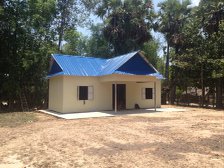
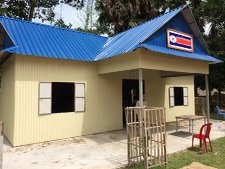
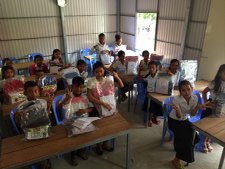
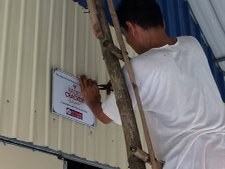
Chur Teil Village, Prey Veng Province (80 Children)
Photos clockwise from top left
1. Jonny Hamill presenting CFC provincial leader, Net Ban, with the Radio Cracker sign.
2. Photo taken in September when the structure was complete but furnishing was yet to be purchased.
3. Classrooms fully furnished.
4. Front profile of the classroom.
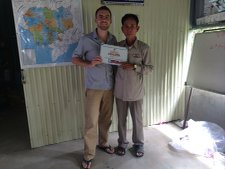
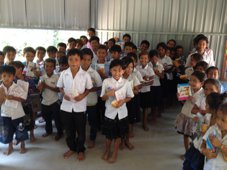
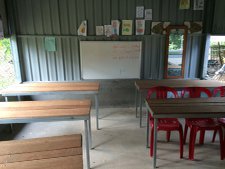
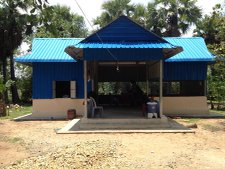
KohSvey Village, Pursat Province (36 Children)
Photos clockwise from top left
1. Completed classroom in September 2014.
2. Furnishing and teaching aids being presented to local staff and children.
3. Front profile of the classroom.
4. Children in front of the new building having just received their 2014 school packs.
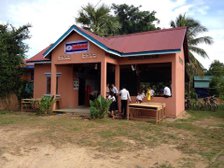
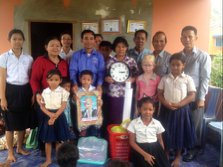
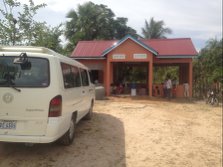
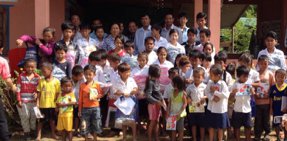
Furnishings for the classrooms include:
- Library books and educational posters
- Tables and chairs
- Teachers’ cupboard
- Whiteboard
- Shelves
- Clock
- Water filter and cups
Thank you to the Radio Cracker board, volunteers and donors for their significant investment into the lives of hundreds of both current and future CFC children.
2013 - Second Sight India
Radio Cracker's donation funded Dr.Samuel's surgery this year at Bamdah Christian Mission Hospital in Bihar, India.
Bamdah is our most secluded partner hospital in Bihar serving a huge area in need. Living accommodation is basic. In September Second Sight’s Andy Richards took his experienced surgical hands there to help resident surgeon Dr. Samuel Murmu. He returned again before the end of the year.
The little boy is called Sibdhan Madhani and is 7years-old. His parents noticed that there were white areas in what should be black pupils in both his eyes and that the child was showing signs of not being able to see. They were right-- he had congenital cataract.
They were turned away by hospitals in the state of Jharkhand where they live but then heard about Bamdah. The travelled over the border to Bihar and Dr.Samuel performed the cataract surgery on the left eye with good results. They will return for surgery on other other eye.
Dr.Samuel's team are doing well in their targeted area of Chakai in Bihar in which they hope to totally eradicate cataract blindness. There is no other charitable or government hospital doing this work.
2013 - E3 Initiative
Radio Cracker donated £10,000 to the work of E3 Initiative's partner, Key Ministry International (KMI) in Pietermaritzburg, South Africa. The funds have been spent on developing a Cassava farm and starting a second microfinance group in a township called France.
In August the Cassava plants were starting to produce leaves. Cassava leaves and roots are used for food in most countries in East and Southern Africa. These photos show the progress made by Key Ministry with the funds from Radio Cracker.
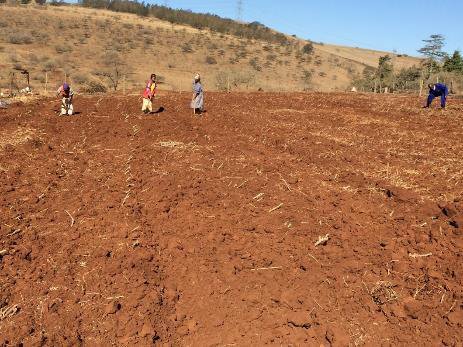
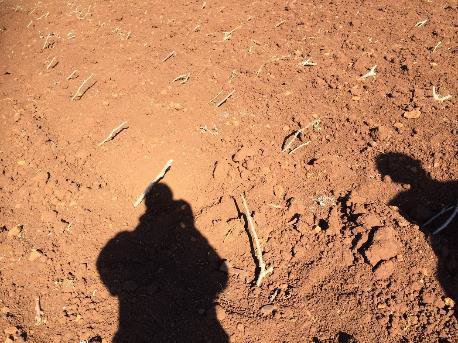
As per the budget, Key Ministry managed to purchase a vehicle. They bought a bigger second hand vehicle, which is in good condition, to enable them to drive safely on untarred roads that lead to the Cassava farm.
The vehicle is a huge asset to KMI. It is mostly used to transport people and farm materials to and from the farm, and also church members to their homes after the Sunday Church service. It has even been used to transport the sick within the refugee community to the hospital.
One of the photos below shows Revd Samson standing by the fence that is being put up to prevent cattle and goats from neighbouring farms destroying the Cassava crops. All materials for the fencing were bought with funds from Radio Cracker and transported to the farm using the KMI vehicle.
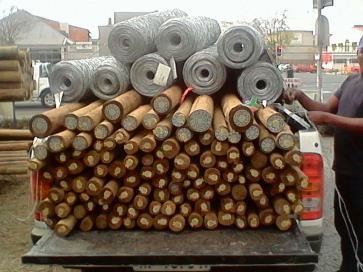
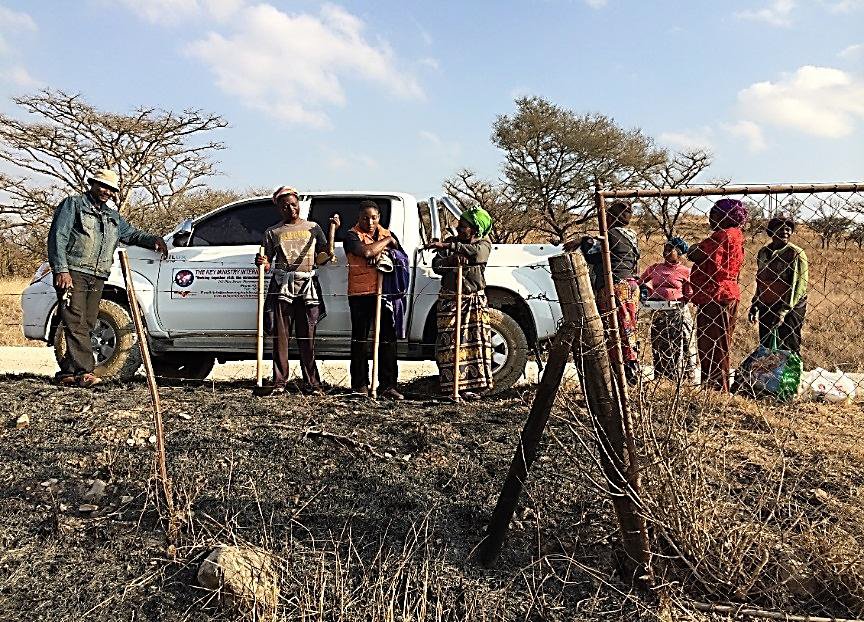
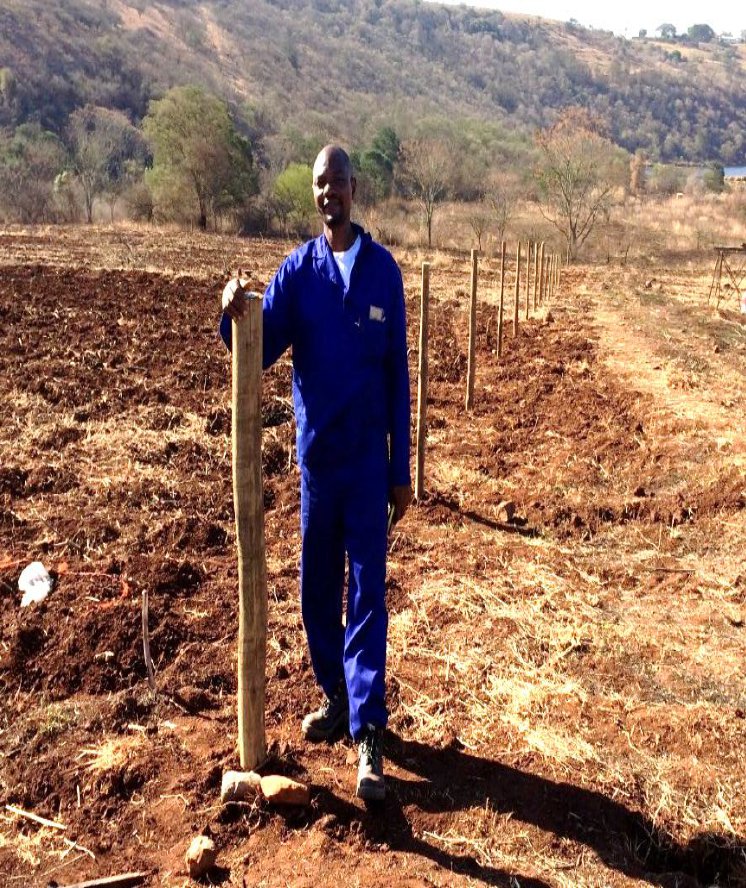
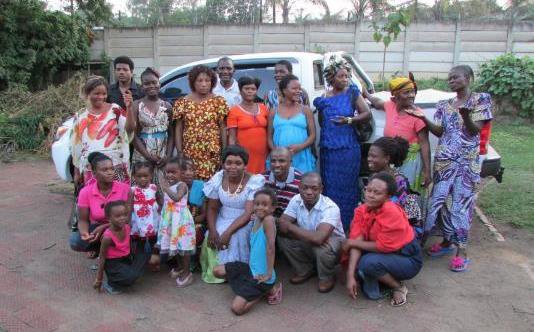
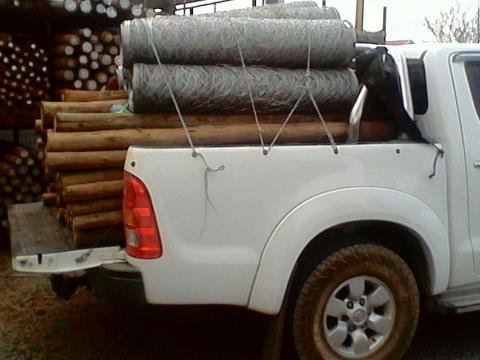
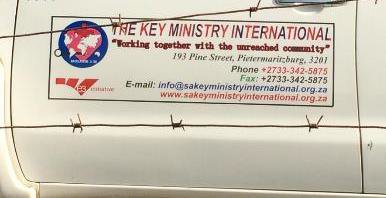
The funding from Radio Cracker has also helped to initiate a second E3 Microfinance group in France Township, a place known for xenophobic attacks against refugees. Several refugees have been brutally murdered in this township. The group consists of refugee women who were trained by KMI staff and are now starting small businesses so they can provide for their families.
2013 - Emms International
Malawi has, at 10%, one of the highest rates of HIV in the world. There are over 1.4 million Malawians living with the disease!
Radio Cracker donated £11,731.00 to EMMS International for a project to recruit, train and equip HIV+ ‘mother buddies’ to support HIV+ pregnant women. When the project is over, approximately 1,000 women and their partners will have been tested for HIV and given advice, support and information on how to prevent HIV transmission. Also, 600 HIV+ mothers will have nutritional support, access to reliable treatment and social support, and medication to prevent ‘mother to child’ HIV transmission.
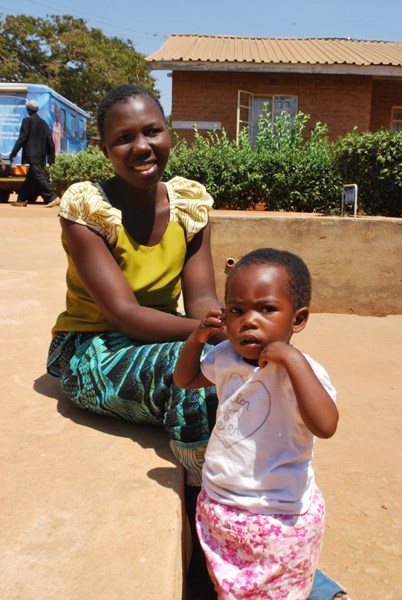
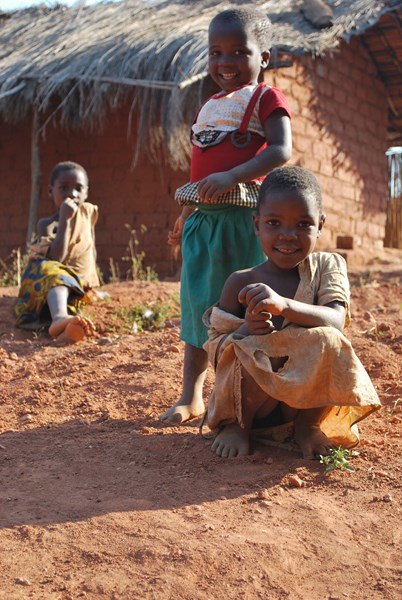
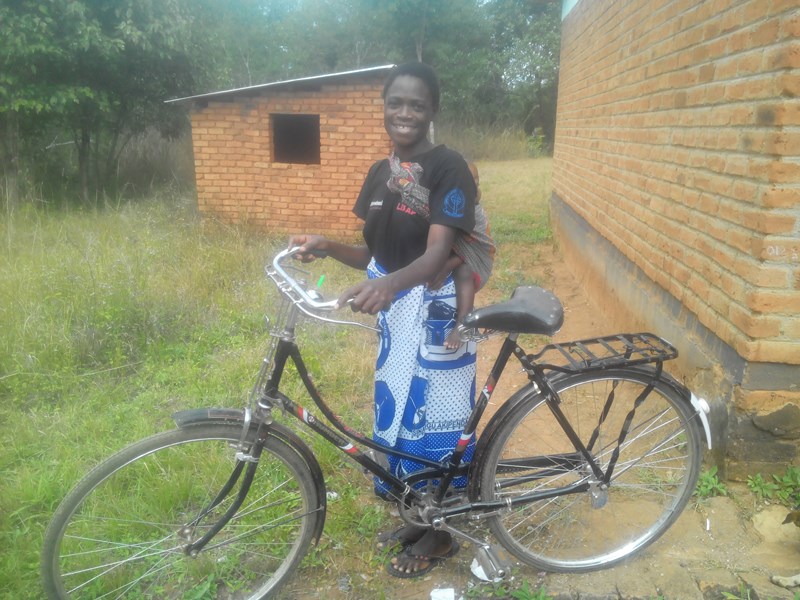
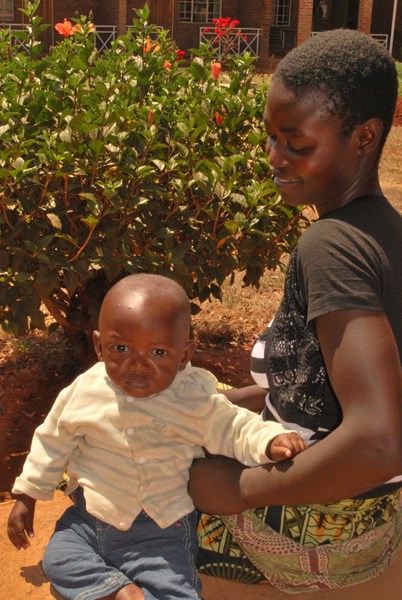
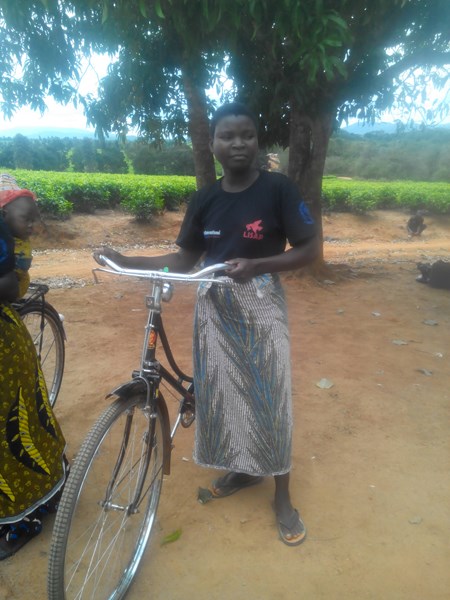
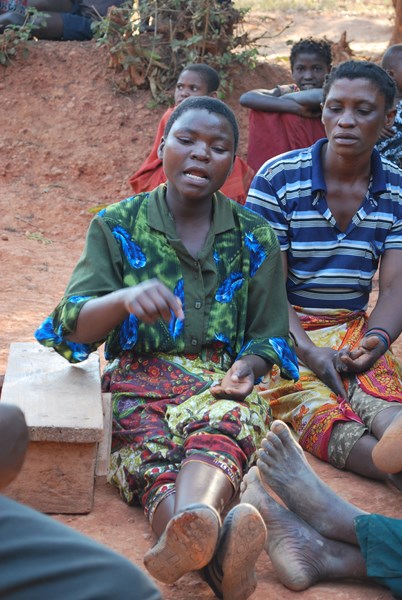
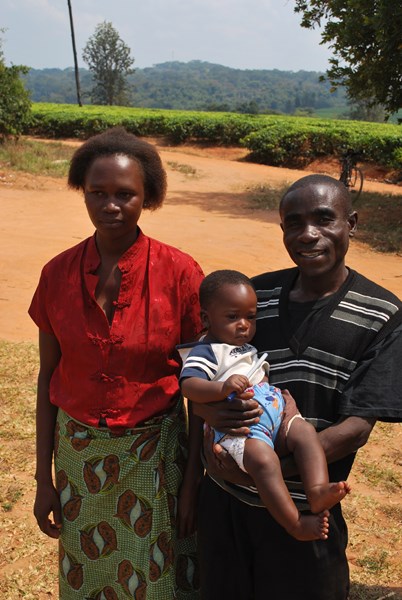
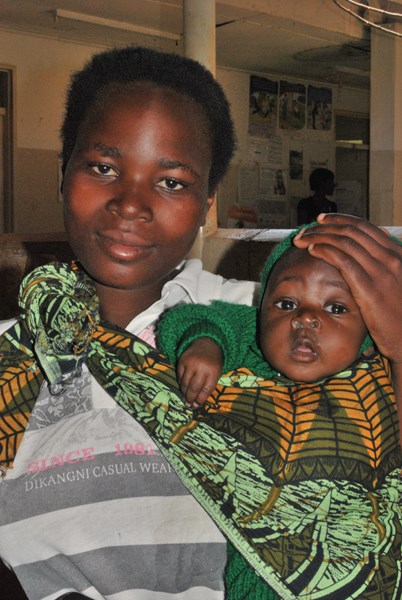
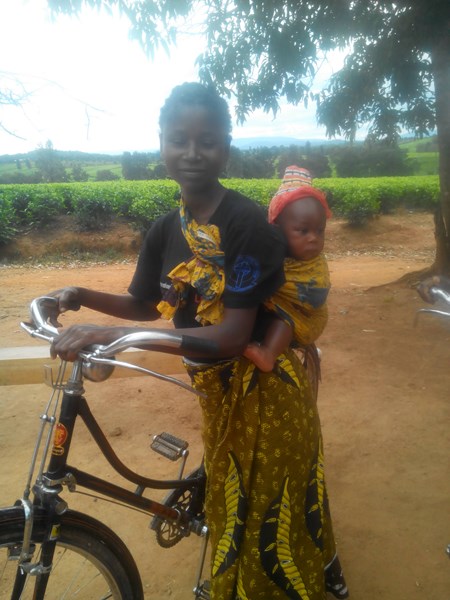
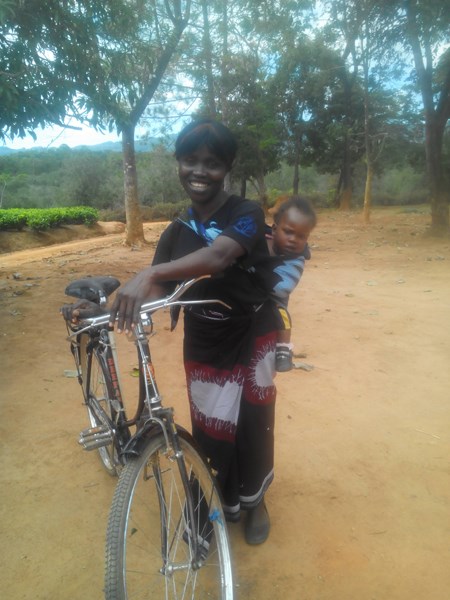
2013 - Tearfund
SUMMARY
Project recap:The indigenous people of Honduras’ Mosquitia region struggled to access
clean water during the dry season. Skin complaints among the women were common due to their
practice of washing laundry standing waist-deep in the lagoon. This project provided rainwater
collectors, eco-laundries and sanitation education to help the residents lead healthier lives.
The results: Rainwater harvesting tanks have been installed to provide a safe, reliable source of water for 80 families in five communities. The same communities have also received an eco-laundry to improve their health and environment. Eighty community leaders have been trained in good hygiene and sanitation practices.
Thank you for your support.

HOW HAS THIS PROJECT MADE A DIFFERENCE?
For Efigenia, dirty water used to make her life in Cocobila on the Mosquitia Coast a daily struggle.
‘We spent several summers taking water from small wells (only one foot deep) on the edges of the lagoon,’ she says. ‘The water is reddish and salty.’ The community members had to dig many of these shallow wells to try to meet their water needs – but danger was lurking beneath the surface.
‘I would normally feel unwell because the taste of the water sickened me,’ Efigenia remembers. ‘Sometimes the children had diarrhoea, mostly when they went to school and drank water directly from the wells.’
When Mopawi began talking to the community about safe water, they all agreed that a way of collecting clean water was a necessity. Since then, Mopawi staff have worked with the community to install a rainwater harvesting tank with a capacity of 5,000 litres.

Efigenia has seen a remarkable change in her community since the start of the project. ‘We are in a better spirits because our stomachs no longer hurt after drinking water,’ she says. The improvement can literally be seen in the colour of the food they cook: ‘The rice, yuca [cassava] and green bananas used to get dark every time we cooked them in the past,’ she remembers. ‘Now they look different.’
‘We are very happy!’ Efigenia says. ‘Thank God that this project chose our neighbourhood. God has heard our prayers and helped us.’
WHAT DID THE PROJECT ACHIEVE?
Scores of people like Efigenia are now feeling the benefits of cleaner water and healthier lives.
· Clean water: Five rainwater collector tanks have been installed in five communities, providing safe, clean water for 80 families.
· Eco-laundry facilities: Five eco-laundries have been installed, meaning that 100 families now have access to a safe, environmentally friendly way of washing their clothes. There are already reports that the skin complaints that women previously suffered with are disappearing, as they no longer need to wash their laundry in the lagoon.
· Sanitation education: Eighty community leaders have been trained in basic hygiene and sanitation, including managing water use in the home and the importance of hand-washing.
WHAT IMPACT WILL THIS HAVE IN THE FUTURE?
This project has been designed with sustainability in mind and should provide clean water and
sanitation facilities for the communities for years to come. Forty community leaders have been
trained to install and operate the water tanks. The beneficiaries have agreed to contribute a
small monthly fee towards the maintenance of the eco-laundries. The amount of soap used by the
eco-laundries is much less than that required for washing clothes in the lagoon, meaning families
will also feel financial benefits.
Although it is early days as yet, in the future it is hoped that the lagoon’s environment will improve through the use of the eco-laundries.

2013 - Raise the Roof
"Raise the Roof (NI) has been established to construct a seven to ten classroomed school in Uganda, in the hope of providing much needed facilities for vulnerable African children by offering them an education and instilling a sense of integration, acceptance and unity in young people from all walks of life and backgrounds.
The aim of the Management Committee of Raise The Roof(NI) in presenting the sizeable challenge to build a school for under privileged children in Uganda, is to develop, in our choir members, the attributes of generosity, appreciation and responsibility towards the needs of others whilst enjoying being part of a community choir who work together in harmony towards those goals.
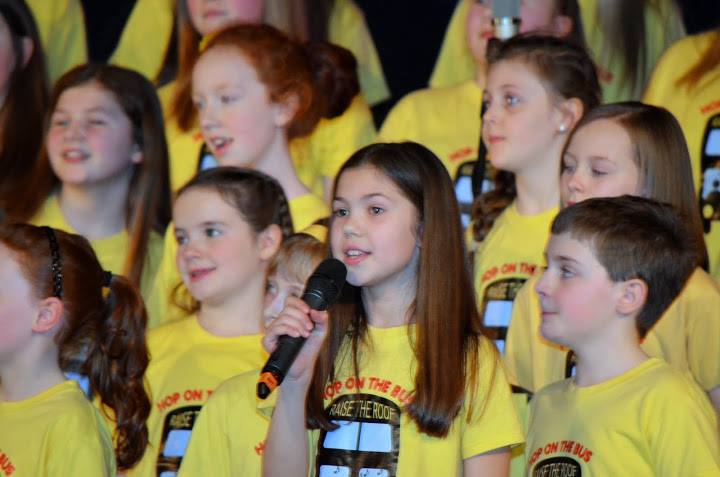
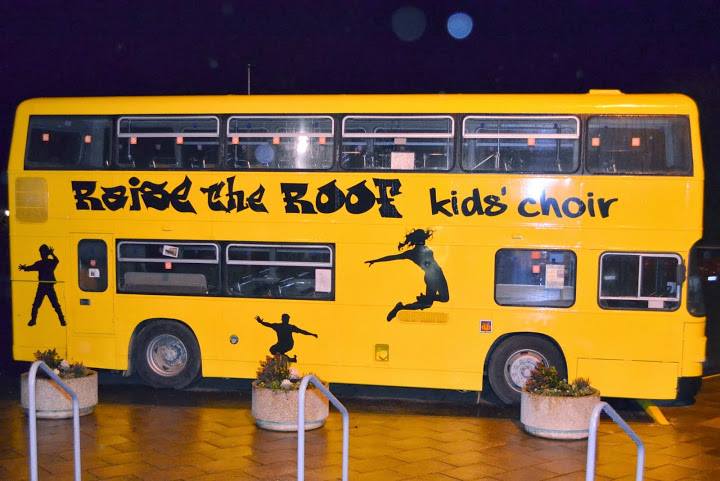
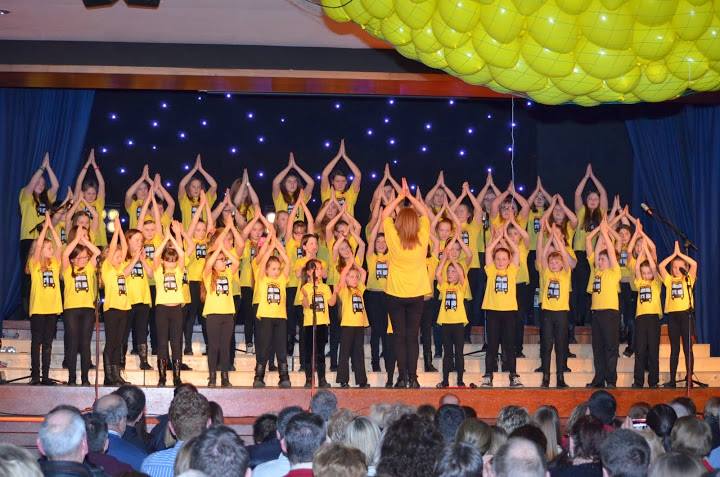
Radio Cracker has donated £10k out of the targetted £75k.
Two Classroom blocks plus latrine facilities will be initially constructed. Once the requisite funding is in place, the timeframe is 4-5 months from tendering to completion of the project.
The local community is estimated at 2000 and the area has a minimum of 800 children who will benefit from this project.
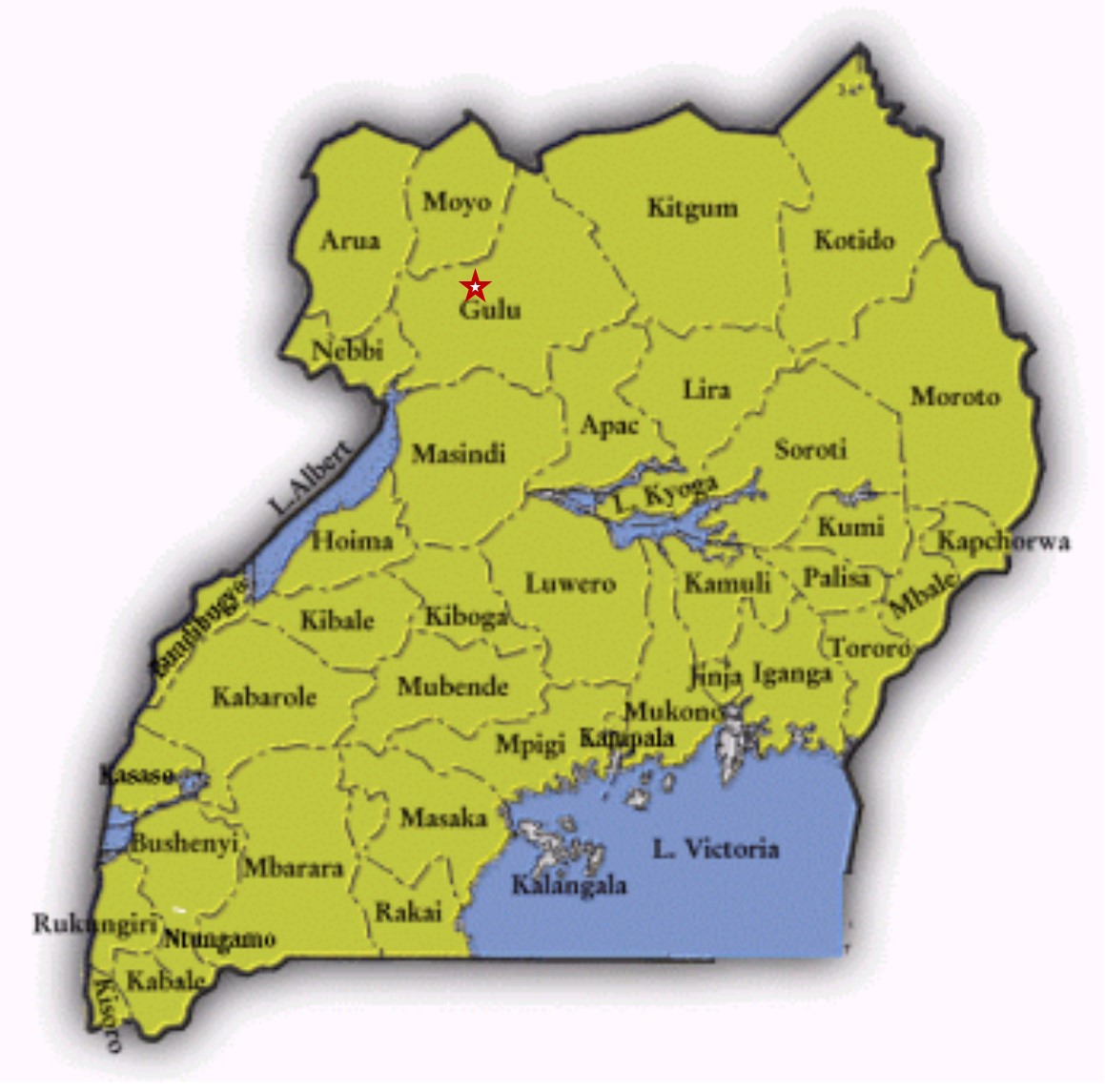
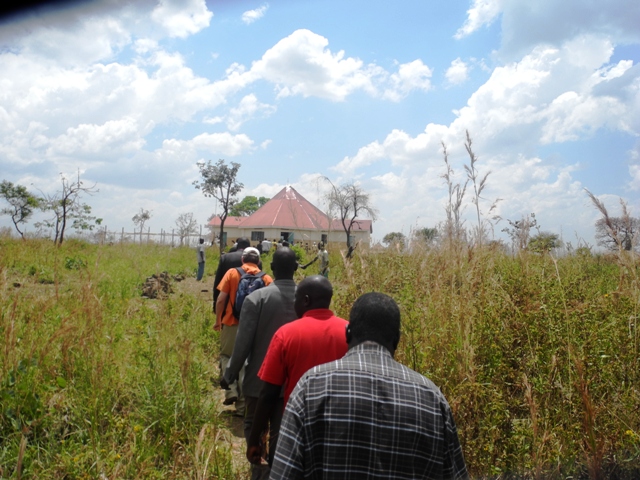
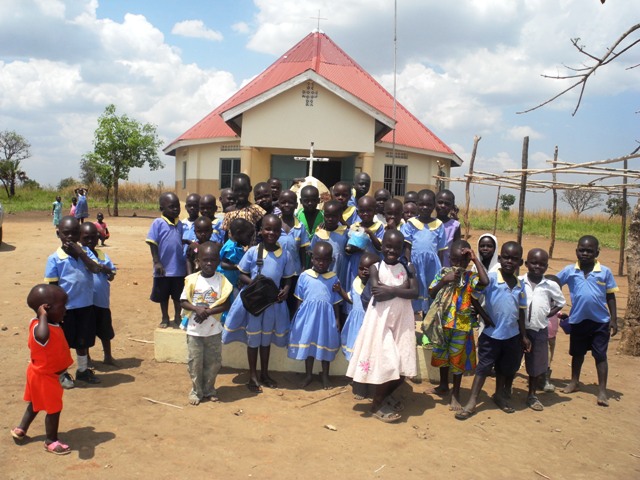
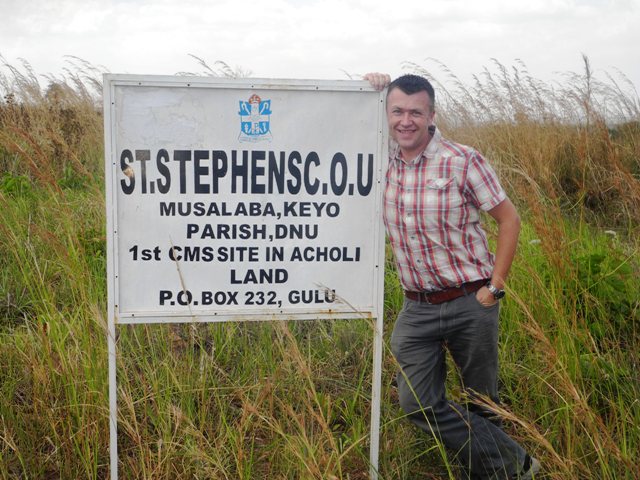
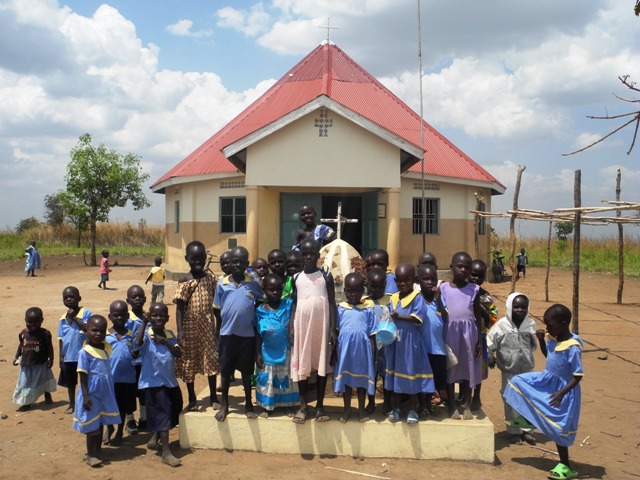
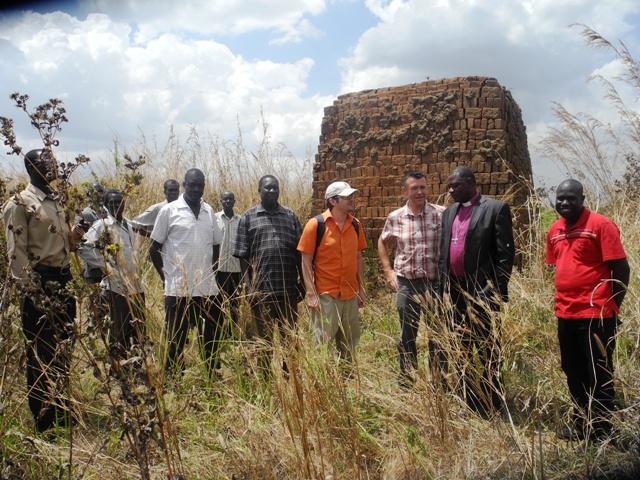
2012 Projects
- Chinchpada Christian Hospital is a community hospital in a remote rural area in northern India, serving some of the poorest people, living in 938 different villages. 75% of the village families live on less than $1.25 per day. Over 50% of the girls are married before they are 18 years old and infant mortality is about sixteen times that in the UK. Despite having to close part of the hospital due to general decay leading to unsanitary and unfit conditions, the hospital still managed, last year, to care for 1,600 inpatients, 6,000 outpatients and to deliver 200 babies and to carry out 400 surgical procedures. If you support Radio Cracker this year, then we will give EMMS International £9,500.00 to rebuild the Medical Surgical Wards and to harvest and store rainwater for the hospital’s use.
- 40% of the world’s blind population live in India. About 75% of these blind people can be cured by a simple cataract operation costing around £18.00. Second Sight works in Bihar State in India and hopes to cure up to 60,000 blind people this year. All their professionals are volunteers and nothing is spent on administration, salaries or publicity. Close your eyes for a second or two and imagine what it would be like if you were permanently blind…..and then please think seriously about helping Radio Cracker to give Second Sight £4,500.00 so that 250 blind people can see again.
- There is a village in Tanzania, called Samaria. About 331 people live there, and of those, 83 are lepers. Samaria is a leper colony. There is no electricity, no easily accessible clean water, poor sanitation and everyone sleeps on the ground. The people are largely shunned by the surrounding villagers. Come to the Radio Cracker Christmas Shop. Look at the photograph on the wall of John the Leper and try not to feel sorry for him. But sometimes, and this is one of them, when ‘sorry’ doesn’t help. The Leprosy Mission is desperately trying to improve the lives of these poor people and Radio Cracker, with your support, will give them this year £12,500.00 to sink a borehole in the village so that there may be safe drinking water for everyone. And perhaps even more importantly, everyone in Samaria will know that they are not forgotten and that someone cares for them!
- In Guatemala, five of the ten leading causes of death are water related diseases. 43% of infant deaths are caused by diarrhoea. In a country with the fourth highest malnutrition rate in the world, parasites transferred by waterborne contamination are consuming the nutrition children need! Do you think about any of this as you drink water from your tap or bottle? Probably not, but it is good that someone is thinking about it. Compassion International is hoping to give, and train 200 families in the use of, water filter units. These remove 99.9 % of bacterial contaminants in water and literally will last a lifetime. Please help Radio Cracker to meet the £10,000.00 cost of these units and save the lives of hundreds of children!
- In a remote part of the jungle in Ecuador, there is a small native community in a place called Kiim. About four years ago, HCJB (which stands for ‘Heralding Jesus Christ’s Blessings’) cleaned up the village well and installed a manual pump. This worked well for a couple of years until it over-corroded in the acidic jungle water. Since then, the villagers have had to resort to collecting water from the nearest stream with all the associated hardship and health problems. HCJB, like all the relief organisations, are now realising that clean drinking water is the key to good health for such communities, as well as a practical demonstration of God’s love for them. And so, with your help, Radio Cracker hopes to give HJCB £6,550.00 to install a solar-powered pump, a water tower and storage tank.
- Tulca is a small village in a poor, rural area of Romania. There are lots of gypsy children in the village and unfortunately, the educational system is failing many of them. Forty such children, at the village school cannot read and write and some of these are as old as fourteen. Asociatia Tulca was founded in 2002 by a Christian Couple, John and Sylvia Marcus. John is originally from Harryville. They have founded an After-school Club to provide extra tuition to the gypsy children and have had wonderful success to date. However, the demand is so great, they need to expand. These children deserve a chance to make something of their lives, don’t they? Will you help Radio Cracker to give Asociatia Tulca £12,000.00 to build and furbish another classroom so that more children can fulfil their potential and break out of the intergenerational poverty cycle.
- Imagine you are a bright child but that your ‘home’ is in the slums of Delhi. How do you make something of your life? How do you satisfy your thirst for knowledge? Who will help you? Well, an organisation called Asha has been trying to do just that since it was founded in 1988. It works with over 400,000 people in 50 slum colonies. Many of us have seen these slums on TV and they are truly horrendous. But from these terrible conditions, do emerge bright and gifted young people. This year, Asha wants to support 18 such young people through second and third level education, and it has asked Radio Cracker for £8,100.00 to help them. As clean water is the key to good health; so a good education is the key to escaping grinding poverty. As good parents, we do everything to help our children get a good education. Please give us a pound or two to help some other children also!
- Vision of Good Hope, Moldova is a well known and much-respected relief organisation in the Ballymena area. For over ten years they have been looking after children in an orphanage in Moldova, called The House of Hope. Many of those children have now reached the age where they are ready to move into employment (if they can find any in this very poor country) or into third-level education. However, they are still legally in the care of VGHM. And so, a house adjacent to the orphanage has been bought and with your help, Radio Cracker hopes to give VGHM £10,000.00 to fit out and furnish this half-way house for their older orphans. Without this facility, much of the preceding ten years’ good work could be wasted. Will you please help us to bring God’s love to these young people who have no family and who need someone to help them. If you don’t help them, who will?
2012 - Chinchpada Christian Hospital
Chinchpada Christian Hospital – Maharashtra India
Rebuilding the surgical ward and replacement of water supply and storage
Last year, EMMS International asked Radio Cracker to support the rebuilding of the surgical ward at Chinchpada Hospital and the upgrade and replacement of the water supply and storage system. This work is now nearly completed. The following photographs were taken at the end of June 2013 and beginning of July. The work is expected to finish within the next 2 months.
EMMS International is delighted with the progress so far and the impact on the local community. We were unexpectedly honoured with an award in July at the Institute of Fundraising National Convention in London for the fundraising appeal for the rebuilding of Chinchpada. Radio Cracker’s support was essential in achieving this and we are happy to update you on the progress that your contribution has helped make possible.



This young woman is being trained as an assistant builder and will provide an important contribution to her family’s income as well as ensuring that this rural community has access to improved healthcare. These villages are some of the poorest in India with 75% of families in the area living on less than 80p per day. Chinchpada Christian Hospital serves as the only free and low cost medical facility in the area.
Material and fuel costs have been high, so managing the budget carefully has been a priority. Reusing some of the quality teak timber and roof tiles has helped to maximise the budget and minimise the impact on the local environment.


The hospital is currently serving 998 villages in the Nandurbar district. This is over 1.3 million people. Despite the difficult and changing conditions over the past year, the hospital has carried out over 1800 surgical procedures and delivered 135 babies. As a result of this final phase of renovation and building, the hospital will now be able to start to meet the growing needs of the area.

This is the water supply works for the surgical and other blocks. In addition, there are now toilets for male/female surgical wards which are part of the surgical block. A bore-well is being used to supply water to overhead tanks in the surgical ward.
This bore-well is recharged by a water-harvesting system integrated all around the renovated and newly constructed blocks, so ground water is recharged by water harvesting and stored in natural underground tanks for filtration.

Vidya is 3 years old. She is sitting with her parents on a new resting area built around a tree in the centre of the hospital to provide shade for hospital patients. She has a fever resulting from an infection and has been admitted so she can have intravenous antibiotics and be monitored further.
The newly renovated buildings offer proper clinical conditions in which to treat patients. Vidya’s parents explain that they have nowhere else to go for treatment. Everywhere else is too far away or too expensive. Chinchpada Christian Hospital is an essential part of their community.
Her parents remember coming to the hospital when Vidya was born. Though they are grateful to the staff, they have no fond memories of the damp and dirty building which once stood here. The delivery room where Vidya was born has already been renovated along with the maternity ward. Now her parents explain it’s new and clean. They feel safe and happy to bring their daughter here.

2012 - Second Sight India
In India poverty and blindness go hand in hand. But cataract surgery can break the cycle of poverty -- in fact it has been listed amongst the Ten Best Health Interventions to Reduce Poverty. An experienced eye surgeon can restore sight in just a few minutes and at a cost of less than £20. For over a decade Second Sight has worked in the state of Bihar-- the poorest state with the greatest number of people who are unnecessarily blind from cataract. And last year nearly 60,000 people had their sight restored thanks to Second Sight's partner hospitals. Radio Cracker supporters funded around 250 operations.
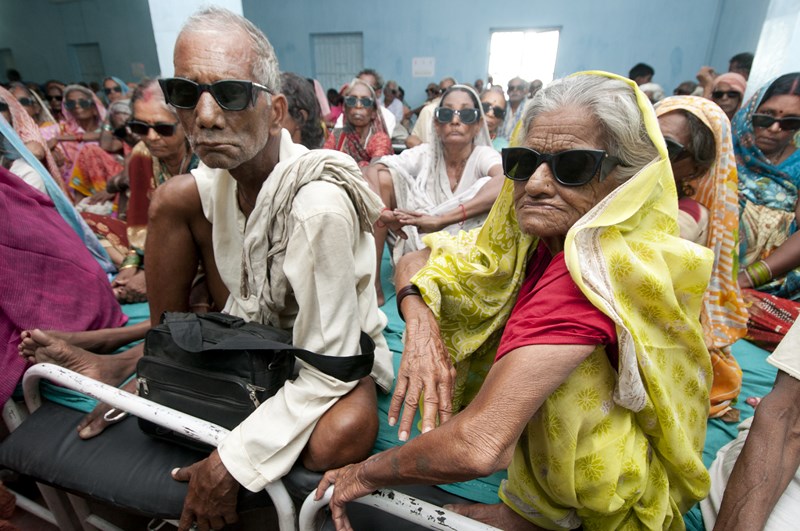
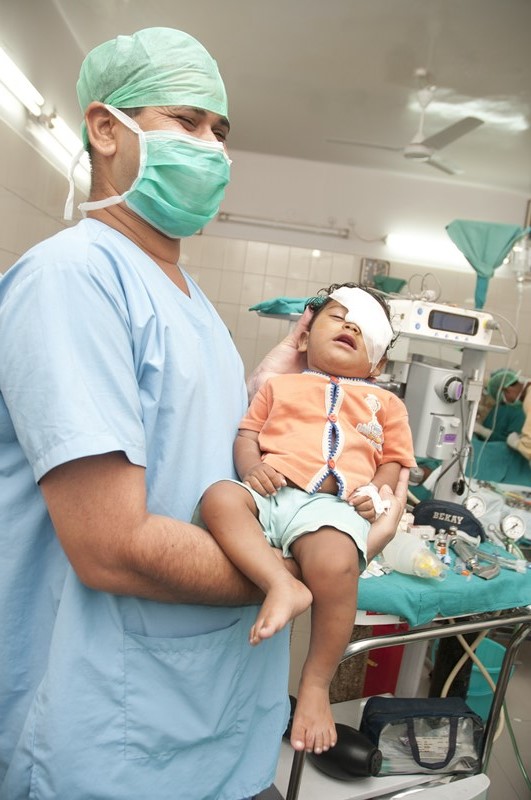
Another achievement in Bihar : a football-education-training scheme for girls once destined for child marriage saw the first rural girl finish her schooling and enter a Diploma course in optometry. In three years she will be a skilled ophthalmic assistant.
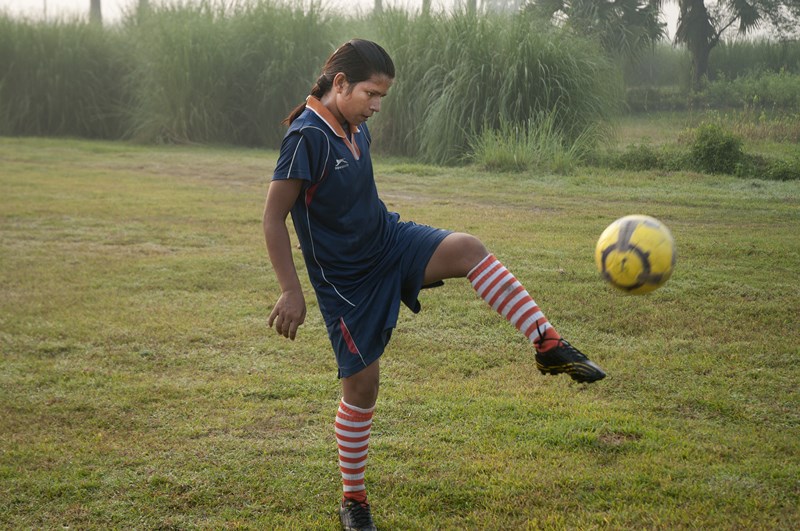
In 2013-2014 Second Sight plans to boost the work of its most remote partner hospital--Bamdah Christian Hospital-- run by a lone ophthalmologist and a small dedicated team and serving perhaps the most neglected area in Bihar state.
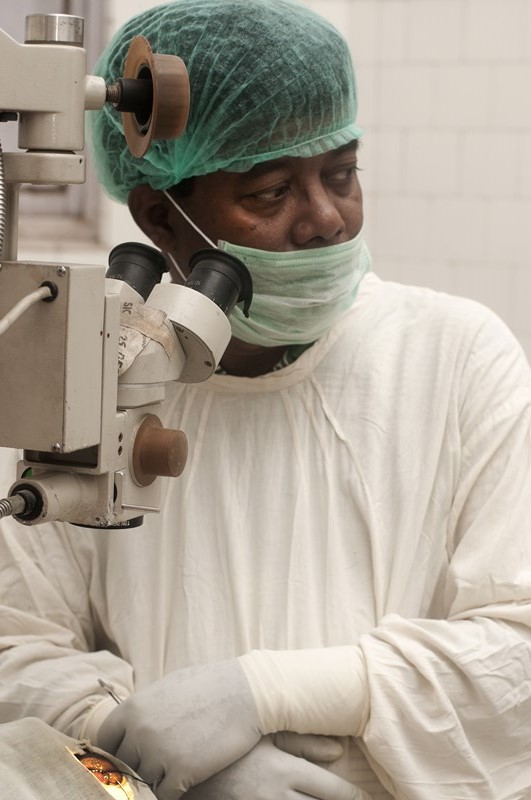
This little three year-old came in to Bamdah. He has congential cataract in both eyes. Dr.Samuel Murmu, the resident eye surgeon-- a Santhal tribesman whose family converted to Christianity two genrations ago-- did the surgery for free and the child is seeing well post-operatively.Working alongside Dr.Samuel is Second Sight's own volunteer eye surgeon Andy Richards, performing exquisitive surgery at the age of 79.
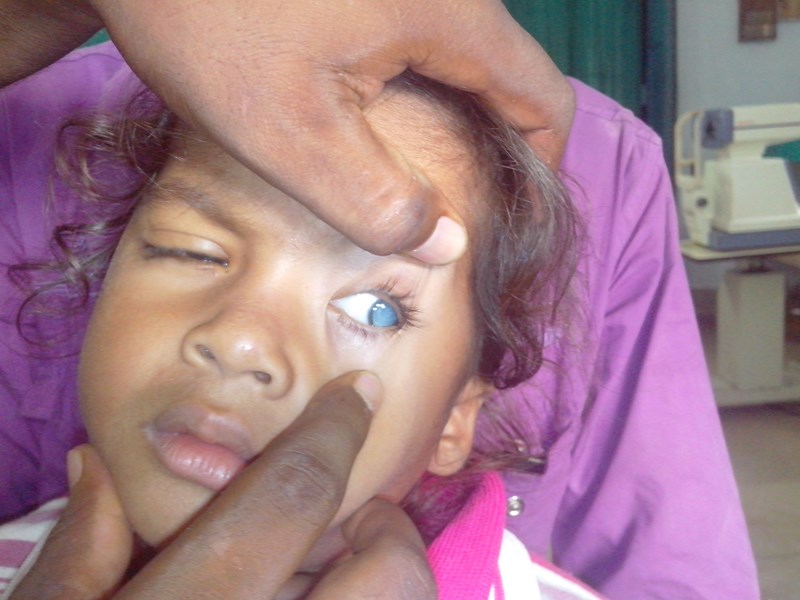
Optimism is high about Bamdah stepping up its contribution to the eradication of cataract blindness in this much neglected area.
All Second Sight's professionals-- from eye surgeons to fundraisers to english teachers to football coaches-- are volunteers. No donated money is spent on administration, salaries or publicity. As a result this small no-frills charity punches well above its weight amongst organisations working to eradicate blindness in India
2012 - Compassion International
The video below shows details of the effect of Radio Cracker's support in Guatemala...
2012 - HCJB
The community of Kiim is located deep in the Ecuadorian jungle. In September 2013, two of HCJB’s missionaries, Wim and Eric, visited Kiim, taking a bus for five hours and then walking along a very muddy trail for about one and a half hours.
Wim and Eric had been invited by the community to come and inspect the timber which the people had cut from the surrounding jungle. This timber will be used to construct the water tower which forms a large part of the Radio Cracker water project. Radio Cracker funds will be used to purchase a submersible pump, solar panels and to send cement, pipes and other materials into the jungle. HCJB missionaries along with the community themselves will install the pump into the existing well, the water will be pumped up the nine metre tall tower and from there the local people will be able to take the clean well water from a communal tap at the base of the tower. In the future, the community will be able to work on a second stage of the project to build a pipe network which will deliver clean well water directly to each family’s house.
Wim and Eric found that the people in Kiim have pulled together to harvest this wood and to prepare it using hand tools and chainsaws only, often bringing the timber almost an hour’s walk away. Almost all the timber is ready for the water tower but on inspection they agreed that some of the pieces show signs of rot. Wim and Eric asked that they prepare the remaining pieces and notify them when the community is ready.
In asking the community to gather the locally available materials themselves, HCJB seeks to empower the local people and to foster a sense of ownership of the project, although this approach does mean that the project moves at the pace of the community. Kiim is a highly motivated community and the people there are keen to see this project move forward.
In January, Eric reported that they were able to get the four main posts painted, upright and most of the cement poured for the bases. The community worked really hard. They had already hand carried yards of sand from the river in sacks, cut 22 logs 6" x 8" x 14 feet long, and 4 posts 10" x 10" x 30 feet long.
The people worked well together to setup posts and hand mix yards of cement. They are really looking forward to completing the project this year.
The photos below show progress to date:
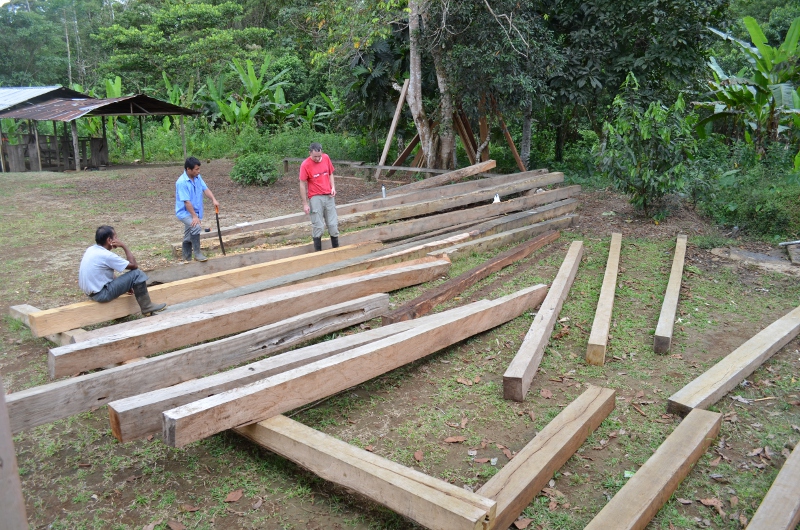
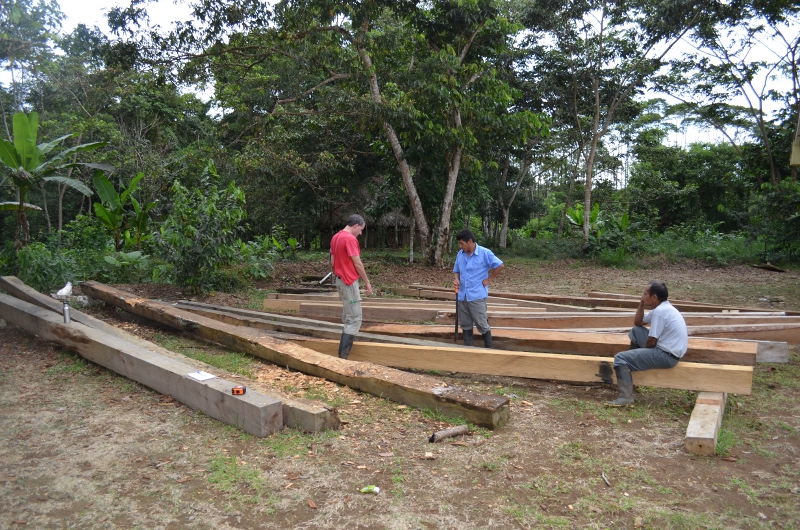
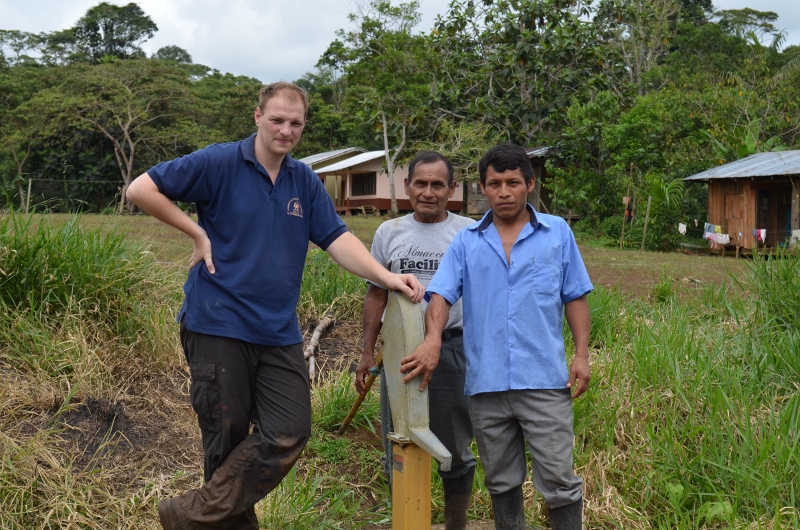
2012 - Asociatia Tulca
The photos below show the progress being made on the new Radio Cracker funded classroom:
2012 - Asha
ONE YEAR EDUCATION PROJECT TO IMPROVE SLUM CHILDREN’S ACCESS TO HIGHER EDUCATION
Introduction
The Higher education project supported by Radio Cracker in the slums of Delhi has completed five
months in July 2013. The project through its course not only achieved the quantifiable outcomes
in relation to the objectives outlined in the proposal but also was able to create an environment
of acceptance in the above mentioned communities towards education. Considering the sustainability
of the project, it was not only the students, but also the families who were involved in the education
project.
The biggest achievement of the project could be seen from the result of class XII national board Examination results. All the 15 children from the slum under this programme who were supported have passed.
Objective 1:
To provide materials and information that will support students during their final years of school
and improve their chances of getting good results
Outcomes:
Sample paper books played a crucial role in the preparation of a student preparing for her/his final
years of schooling (11th and 12th class). Based on the specific demands of the students, sample papers
and guide books were distributed. This year sample paper books in subjects like Economics, History,
Political Science, English, Accountancy, Physics, Chemistry, and Biology, were distributed to 15 students
in different slum communities. After distribution of the sample papers, the staff conducted mock exams
at the slum centres in order to monitor directly the usage of the sample paper books. The regular
follow-up by the staff motivated the students to be serious in their studies and strive for high marks
in the national Exams.
Apart from this, the students were also encouraged to use the slum centre for studying as it provided a quiet environment away from the hustle and bustle of the slum. Computers and newspaper facilities were also utilized by the students to complement their studies.
In June 2013, All 10 children who were studying in the final year of schooling got admission in regular courses in different colleges of Delhi University. This is quite commendable as more students are going for higher education and getting admission to the Delhi University colleges.
Objective 2:
To promote the value of higher education both to prospective students, their families and among wider
slum communities
Outcomes:
The biggest challenge that Asha faces is to make the slum dwellers understand the importance of higher
education as education is not put as priority and the parents sometimes force their children to work
to supplement the family income. This happens mostly at the expense of the child’s education. The Asha
staff through the past 5 months has been working closely with the families of the student slum
communities. Asha conducted 14 workshops on importance of education in each of its slum centers.
The workshops also stressed on the long term benefits that education would provide the family in terms
of income as well as social standing. The Asha women’s groups as well as the children’s group also were
roped in spreading the awareness about education and with their support the dropout rate of the children
from school decreased substantially.
Asha staff also organised weekly meeting with the final year school students to get a feedback regarding their progress as well as current status of their studies. These meetings were also used as forums for the students to share among themselves the challenges they face and study techniques that are used and as a result form a support group.
The community as a whole has been appreciating the efforts of Asha staff and the community volunteers. However there have been pockets of resistance where efforts of Asha have failed to convince families to return children to school. Asha sees these obstacles as challenges to be overcome in the coming year.
Objective 3:
To motivate students in their final year of school and provide them with all the information and guidance
they need to choose a suitable career path.
Outcomes:
Asha staff held workshops with the students to impart information on different careers options
available. One to one meetings were also held to discuss their future plan and to remove any kind of
apprehensions concerning their careers. Educational trips were also organized to different colleges
and institutes offering professional courses and orientation sessions were arranged with the faculty
to remove any doubts the students may have.
Students who are already in the university from the slums are acting as mentors for the students doing their final two years of school. Today the students from the three slums are very clear as regard to their future course.
Objective 4:
To encourage an increased number of girls to pursue their final year of school thus enhancing
prospective admission to tertiary education.
Special efforts were made to encourage girl’s education. Out of the 10 students who had appeared for the final year school leaving exam in March 2013, 6 were girls. This is quite an achievement for Asha in the slum community which till very recently thought about girls in terms of household work and marriage only.
Conclusion
The efforts put in by Staff of Asha and the support received from Radio Cracker in last few months has
brought about many positive changes in the lives of students, their families and the slum communities
as a whole. Many more students are following the examples and are aiming for higher education. The
community has started realizing the importance and value of education and this has given encouragement
to Asha staff to go the extra mile in molding an educated generation from the slum communities.
Case Study of Senthil
Senthil wanted to become an accountant and he started working towards it from his childhood, in
spite of all the hardships of living in a slum. Senthil lives his parents and four siblings in Jeewan
Nagar slum colony. He has been associated with Asha since he was 5 years old. Senthil always stood
first in his class and won many prizes in school.
Although Senthil‘s parents were supportive of their children’s studies but were unable to support due to financial problems. His father is a labourer and his mother works as maid. Due to this Senthil‘s sister had to leave her studies to work as sales girl in a showroom.
Asha provided him with books and sample papers and supported and assisted him in many ways so that he could appear for his class X exams confidently. Senthil knew that in order to get into Delhi University he has to work hard. Senthil used to spend at least ten hours every day studying and led disciplined life. As a result of all his hard work he secured 89% in aggregate and 95% in Math and economics and was able to get admission into Venkateshwar College.

Case Study: Deependra
One of the first children from Anna Nagar to have secured admission to the degree course in
Delhi University this year,19 year old Deependra came to Delhi with his mother and younger brother in 2002.
With parents having separated at a very early stage, Deependra initially grew up at his maternal grandfather’s
place in Durgapur, West Bengal before coming to Delhi. “I initially hated to stay in this city.
I had never grown up in such cramped temporary settlements with shared toilets. I was used to the comfortable
lifestyle afforded by my grandparents back in Durgapur. But things were very different here. From the very
first day I resolved to get out of here.” Deependra was introduced to Asha in Standard X where he received
assistance in the form of sample papers and tuition classes. The partnership with Asha continued in
Standard XII all the way to the rigorous and competitive process of admission for the Hindi Honors in
Aurobindo College. Both Deependra and his mother were initially skeptical about his pursuing a four year
full time course in college since he wanted to start working in order to contribute to the four thousand
rupee monthly income (£44) of his mother. However, he has now been convinced by the Asha staff to complete
his education in order to have a more stable and secure life ahead. Slightly introverted but nonetheless
confident boy, Deependra loves to flip through magazines and newspapers having grown up in his grandfather’s
book binding store.

Story of Sevati
Sevati is a 16 year old girl from Dr. Ambedkar Basti slum community in South of Delhi.
She has been associated with Asha right from class 6 through the children’s group. Being
from a Muslim family her prospects of studying beyond 10th class were bleak. Her parents
were of the view that Sevati should get married as soon as she completes class 10. The Asha
staff took special efforts to convince the family about the importance of higher education in
the present world especially for a girl and took counseling sessions for both the parents as
well as the child. Finally the parents allowed Sevati to continue studies after the 10th class.
In March 2013, Sevati completed her school education. To support her studies, Asha gave her reference guide books and sample papers. Her confidence level has really soared high, and she has no inhibitions in expressing herself. She has become very serious about her studies and has enrolled in college so that she could become a banker.
The story of Sevati is the story of hope and is an inspiration to many girls in her Muslim community to follow her example.

Story of Jasbeer
Jasbeer is a 19 year old boy from Dr. Ambedkar Basti slum. His father is a tailor and his mother
is a housewife. The family income is meager enough to make ends meet. When Jasbeer was in his
finishing years of school, he was planning to join some vocational course and get into a small
job, in order to augment the family income. He did not have any plan or inclination to do college.
Asha field staff spoke to both Jasbeer and his family about the value of education. They were
initially reluctant but after constant effort from the side of Asha, the parents allowed Jasbeer
to continue studies after school. Today Jasbeer is in his first year in Bachelor of Arts in
Motilal Nehru College of Delhi University. Jasbeer was able to enroll in college as he was
supported by Asha with college fees.
Going to college has transformed Jasbeer’s life. He has become more confident in facing life. He is now able to pursue his passion for learning the guitar in his college. Recently, he got a part time job which he can support his family as well fund for the extra tutorial classes.

Story of Bindu
Bindu Kumari is the third child among five siblings. Her father, Mr. Vinod Kumar runs a small
flower shop on road side and her mother is a house wife. The family of 7 live in a small one
room house in the slum colony of Ekta Vihar. Today Bindu is in the first year of Bachelor of
Arts in Hindi from Ramlal College of Delhi University. One year ago to think of studying in a
college was just a dream for her.
When Asha staff approached Bindu in her final year of school, she was preparing herself for marriage in few months’ time. Even though she expressed her desire to study further but was not able to voice it in front of her parents, being well aware of their resistance. When the staff from Asha approached the family they expressed their apprehensions regarding her travel arrangements to and fro from college, whether she will able to find a suitable boy once she is graduate etc. After much counseling of the family, Raviat was allowed attend college.
With the family’s approval, the Asha staff immediately got down to assist Bindu in the admission process of the Delhi University colleges. Finally, after much follow up she got admission in Ramlal College and was supported by Asha for the fees.
Today Bindu is very happy to become first in the family to go to college. Her Family also is very proud about her achievement. Bindu is now helping Asha in spreading awareness about education especially among the girl children in her slum colony. Bindu is very grateful towards Asha and its staff for the pursuing the matter with her family and getting their consent and changing her life.

2012 - Vision Of Good Hope Moldova
Some photos of the finished halfway-house:
2011 Projects
- EMMS International – Malawi. Access to clean water is the key to reducing the mortality rate and improving the health of those living in rural and isolated areas. In certain areas, a shallow well can be dug at the cost of £300.00, including pump, labour and other related materials. We hope to be able to pay for many such wells.
- Mission Africa – Nigeria. In Ogugu village, a training centre will be built for widows, abused and vulnerable women. This centre will train women to make clothing and then will provide loans to enable the women to buy their own sewing machines. In due course, the women will become self-supporting and will be able to repay the loans, which will then be available for other such women. Radio Cracker intends to pay for the building and refurbishing of the training centre.
- Mission Africa – Nigeria. While polio is virtually non-existent in the United Kingdom, it is still widespread in certain parts of Nigeria. Healthy children go to sleep at night and awaken the next morning with a slight fever and paralysed limbs. There is no cure and the children are left to get around as best they can, often walking on their hands. Radio Cracker has provided for new wheel chairs for several years now and will do the same again this year.
- Second Sight – India. There are approximately 37 million blind people in the world and 15 million of them live in India. Many are blind due to cataracts and an operation to remove them and give the sufferer back their sight costs only £20.00. By paying for such operations, we hope to restore sight to at least 100 blind people.
- Coaching For Christ – Kenya. Without a proper education, many of Africa’s children are locked into a generational cycle of poverty and deprivation. Last year Radio Cracker helped with the purchase of land and the building of a new and much needed school. The building of the school is nearing an end and we intend providing funds for its completion.
- Kids4School Ministries – Tanzania. Many village children in central Tanzania have only water from puddles and infected lakes to drink. As a result, many die from diarrhoea related diseases from drinking the polluted water, before they reach their fifth birthday. The rains, when they come, can provide clean water for all the school children if properly ‘harvested’ and stored. Radio Cracker would like to provide sufficient funds to build two school water storage tanks.
- Friends of Rif – Morocco. In 2004, an earthquake devastated many villages in the Rif Mountains in north-west Morocco. Seven years later, many villagers are still living in ‘temporary’ mud and straw huts. During the winters, when the rains come and the temperature drops to freezing, hundreds of families are unable to stay dry and warm. Many children struggle and die with related illnesses such as pneumonia. We hope to be in a position to build new earthquake-proof homes for at least three families next year.
2011 - Emms International
Grant from Radio Cracker for building Shallow Wells in Malawi
Why Shallow Wells?
Many of the underlying health problems throughout the world are water-related. This is especially
true in rural areas of Malawi where dysentery, cholera, malaria, and typhoid are often the result
of lack of access to safe drinking water. Many villages in Malawi still depend on surface water
collected from open ponds and water holes. This water not only carries disease but also can be
polluted from farming chemicals and run off from animal tending.

A typical water hole before the construction of a shallow well
When there is no well in a village, young women can spend up to half their day fetching and carrying water from several miles away to meet their household needs. This often means they are unable to attend school and get an education. The creation of shallow wells can not only make a major change in the health of an area, but has a life changing impact on the people in the area, freeing up young women to access school and education.
The project funded by support from Radio Cracker is taking place around the Livingstonia catchment area in northern Malawi with a population of over 90,000 people. Currently, only 30% of this population have access to safe and clean water. In 2011 the area was badly affected by an outbreak of Cholera causing 8 deaths and over 20 hospitalisations at David Gordon Memorial Hospital and the Luwuchi health centre, making this water project a high priority for the people living in the area.
One shallow well can provide safe drinking water for up to 400 people.
As a result of Radio Cracker’s support, 36 new shallow wells will be completed in the next two months (the well digging season is from June to November to take best advantage of the weather and water table levels). This project will ensure clean safe drinking water for over 14,000 people.


"We are very happy to have safe and clean water. We were experiencing a lot of diarrhea cases during the rainy season and spent a lot of money for treatment at the hospital"- Grace Ndovi (Local resident of a village with a recently installed well)
How the money is spent
Each well costs c. £208.00 each – there is slight variation for each well according to
transport costs and local labour costs (36 wells – total £7500.00)
Costs include:
Site identification – survey of water quality and viability assessment of each well
Labour for excavation of the wells – local labour used whenever possible providing employment
to the area
Cement and pump costs – local materials are used whenever possible
Training of the local communities’ water and hygiene committees – on pump use and maintenance
EMMS International is grateful for the support of Radio Cracker’s listeners. Without their
generosity, this project would not have happened.
2011 - Friends of Rif – Morocco
In 2004, an earthquake devastated many villages in the Rif Mountains in north-west Morocco. Seven years later, many villagers are still living in ‘temporary’ mud and straw huts. During the winters, when the rains come and the temperature drops to freezing, hundreds of families are unable to stay dry and warm. Many children struggle and die with related illnesses such as pneumonia. Here are some pictures of the work we have been able to do with your help.
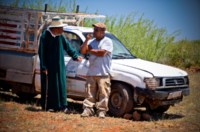
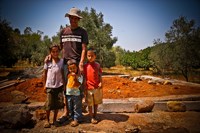
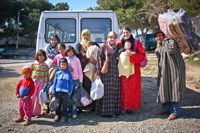
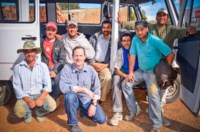
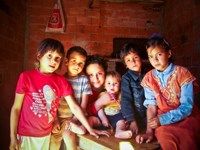
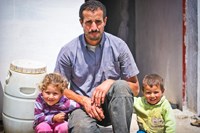
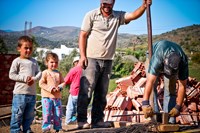
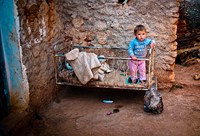
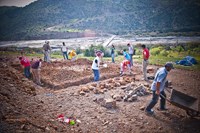
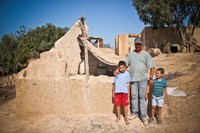
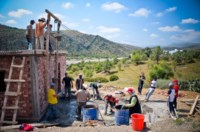
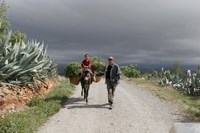
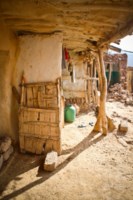
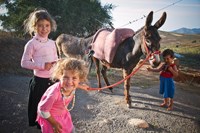
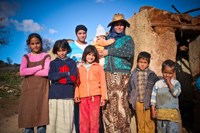
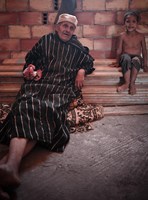
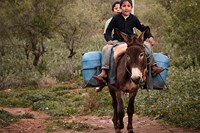
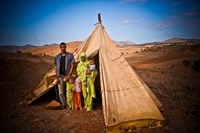
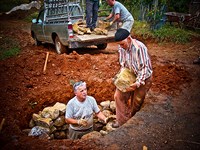
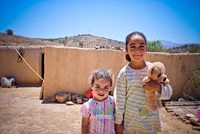
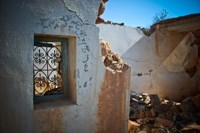
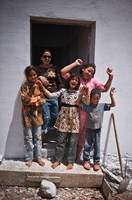
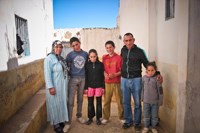
2011 - Second Sight India
Below you can see some photos of one of the many paediatric patients who have benefited from the work of Second Sight.
The eye surgeon was Dr.Samuel Murmu at Bamdah Christian Hospital located in a remote area of the state of Bihar in north India.This place has the worst cataract blindness problem in the world.
This little boy,called Sunil Marandih, aged 8 years, was born with cataract in both eyes. He had some vision and was able to go to school.Then his cataracts progressed to blindness and he started refusing to go to school. (His parents, as is often the case in such situations, did not suspect failing vision as a cause for his truancy).
Staff from Bamdah Christian Hospital found the boy when they went door-to-door doing screening. He has had one eye operated on with great results and will shortly have the other done.
Dr.Samuel is a Christian doctor from one of the many tribal communities in this area of Bihar. He was trained over a period of two years by Second Sight's most experienced ophthalmologists Dr.John Sandford Smith, MBE who is also a committed Christian.
Without Second Sight's training and funding of eye surgery and equipment many children would simply remain blind in Bihar. Even charitable hospitals (of which there are only a few) routinely turn away paediatric patients because their doctors do not have the expertise to operate on them. Christian mission hospitals suffer most from the lack of doctors. Thus Dr.John's training of Dr.Samuel and our funding of the surgery he carries out are having a huge impact on the lives of otherwise forgotten people.
Thank you Radio Cracker for helping us continue this work. We hope that you will be able to do so until we reach our finite objective : the total elimination of cataract blindness in Bihar by the end of the year 2020. Every penny of donated money goes to this work; we do not spend any on admin, salaries our publicity. Every professional who works for Second Sight does so as a volunteer. Our hospitals are very efficient so it costs between £16 and £20 to cure a blind person : this cost includes every cost from going out to villages to screen patients to the artificial lens put into the eye and the post-operative eye drops.
This coming year our partner hospitals in Bihar will cure up up to 60,000 blind people!
More information can be found on www.secondsight.org.uk
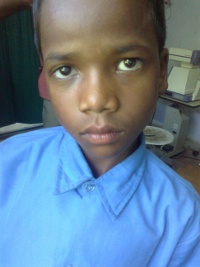
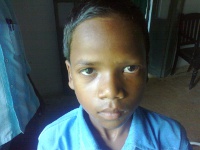
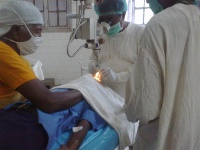
2011 - Kids4School Ministries - Tanzania
Kids4school works in schools in Tanzania enabling children, who otherwise couldn’t, to go to school. We work with some of the poorest families in the world. We are a child sponsorship charity now helping 600 children to get an education. We work in 5 primary schools (6, from January 2013) and 3 secondary schools. We also run vocational training programs including such things as sewing and uniform making to welding training. Many children will not make the academic route so we see vocational training as a very necessary supplemental part of education. Unfortunately the schools where kids4school work are in need a lot of help. That is why we are involved in not only providing uniforms, books etc., but feeding the children a meal every day. This meal could well be their only meal that day. In addition to that, we go farther by providing equipment and books to schools that are short on just about everything. Also, these schools have no water supply, no electricity, no school meals and no proper toilets.
After application to Radio Cracker in 2011, kids4school was given £10,000 to build necessary toilet blocks and water tanks at the schools. The money was used to build a 12-cubicle toilet block at Kitelera Primary School. Radio Cracker also financed 3 water storage tanks, one at Kitelera, one at Nzasa and the other at Bwawani Primary School.
Every 15 seconds a child dies due to polluted drinking water - that is a hard fact to take in. By harvesting rainwater from the school roof into specially constructed concrete water tanks, the children at the schools will have clean, safe drinking water. Previously there was no water at all at any of the schools. In fact the houses and the villages from which the students come have no clean drinking water at all.
In May, when I was in Tanzania I took a picture of a little girl called Pelisi at Nzasa Primary School. She was having her first drink of clean, pure, safe water and it was from a tank that Radio Cracker had provided. I have to say that I was so excited and just a little bit proud of the folks around Ballymena. It is hard to believe, living somewhere like Northern Ireland where there is sometimes too much water that places like Dodoma Region in Tanzania are so dry and dusty that something as common to us as a drink of clean water, is so precious and important to these children.
Because of the generosity of Radio Cracker, children in our schools will have clean safe water to drink. They will know the benefits of proper sanitation with the toilets we have built. With the help of this great group of committed people, kids4school will continue to be able fulfill it’s motto of ‘making a difference’. I would just like to say on behalf of these children at the 3 schools where Radio Cracker have tanks, Asante Sana – thank you very much.
More information at www.kids4school.org








2011 - Coaching For Christ
VISPA High School was officially opened on 22nd August 2012. Thanks to almighty God for his care and providence.
I would like to thank each of you, and I would like to pass on the heart felt thanks of Hellen , George and all the staff and pupils at VISPA for all your kindness, support and generosity in relation to the building and opening of the school.
The opening ceremony was attended by representatives from the Kenyan Dept of Education and the Administrative Chief of Nyanza provence, and the children performed praise and every speaker gave God the glory for His grace. It was a wonderful day.
The pupils see the school as a great blessing and opportunity, and evidence to them that the Lord has a plan for them. Over 140 pupils are now enrolled in the school, many of whom would not have had the chance of a secondary school education without the intervention of VISPA , and also many who have progressed through the primary school at VISPA and who are currently residing at the orphanage. God willing, 90 pupils will be added each year until the school reaches capacity. This will be a challenge , but God has been faithful to date.
Some pictures are below.
Thanks again for your kindness which has blessed so many, and will be a blessing to come.
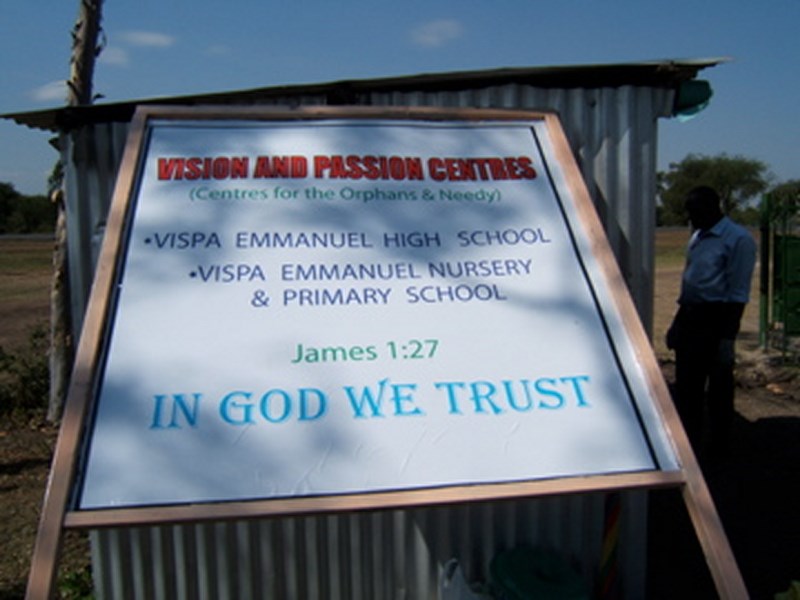
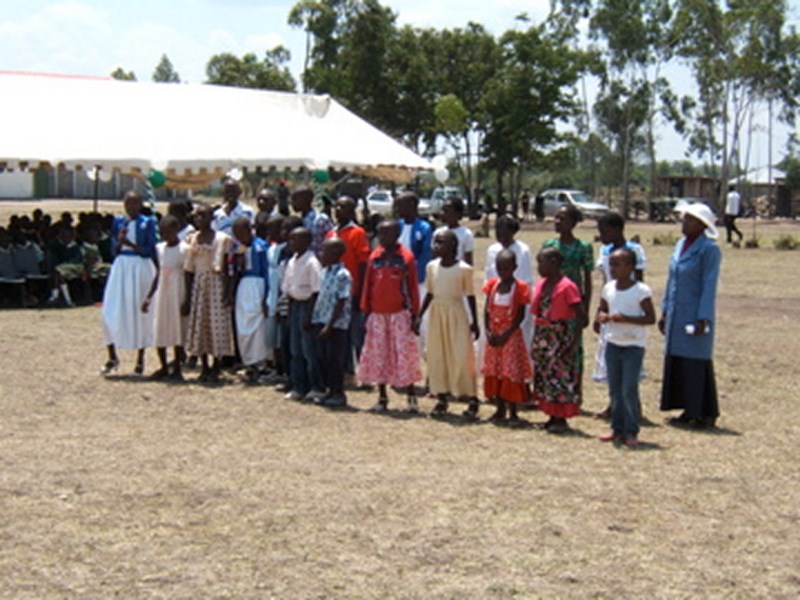
2011 - Mission Africa - Ogugu
ADVANCE started working in Ogugu village in 2007 when members of 2nd Donegore Presbyterian Church came out to build the Donegore Centre for HIV counselling and care. The work has grown to including care and sponsorship of orphans and vulnerable children, general medical assistance, care of new-born babies whose mothers have died in childbirth, provision of clean water and general Christian care outreach to the community.
The SWELL borehole project has been a resounding success in the village. A village committee is up and running to maintain the borehole and the queue for the taps is long every morning and evening. Muslim and Christian women alike stop us in our path when we visit the village now, to thank us for the clean and accessible water! We pass on their thanks to you as it is only through the funding of Radio Cracker that the project was completed.
It is exciting to be able to share with you also that the emergency accommodation block is complete for now and also being used well. Occasionally we have been able to accommodate children and adults in dire need there. For example one of our child headed households headed by Henry spent some nights there some months back when their house was attacked by ants which were moving through the village! They were eventually able to move back to their house. The accommodation Radio Cracker funded in Ogugu has also been extremely useful for us to train church workers and leaders in issues surrounding HIV, compassionate outreach and child protection. This means that Radio Cracker has helped us reach more people throughout Nigeria with important teaching and skills, not just Ogugu. It is a fabulous resource for us to care and provide much needed emergency help for the community and also for us to expand our training to more people.
Part of the Donegore Centre accommodation which was built before the Radio Cracker flats now has permanent residents; Richard and Laura Morrison who are from Ballymoney and have come to work with us for 2 years. They are a wonderful boost to the work there and Richard is now in charge of completing our most recent project funded by Radio Cracker – the skills acquisition centre. We received your generous donation via Mission Africa in September 2012 and in the same month passed the work into Richard’s hands. He reworked the plan for the building and we contracted a builder to do the work. In early November the builder came back to us to change his quote – to a much higher sum! As you will remember with the borehole project it can be very difficult to find reliable workers who will stick to contracts. Therefore, the plan for now is that Richard will start the process of making bricks with local workmen rather than taking on the builder. This has caused some delay in the work, but we are eager to use every gift we receive as wisely as possible so that the money accomplishes as much as possible for the people of Ogugu, so we feel this is best for now.
We have a donation from another church for sewing machines for the Centre when it is built, and we will be working on the teaching manuals in the New Year. Henry, who I mentioned earlier, is an apprentice tailor and we hope that when the building is complete he will be our tailoring teacher. Victor who already works with us and Richard are both skilled in teaching basic computing so they will take on that part of the skills Centre. We hope that now the rains have stopped the building will go up fairly quickly. We already have a priority list of young people and women who will be part of our first intake next year.
One of the girls who will be a priority for the tailoring school is called Paulina. She is now 18 years old and therefore is ready to be ‘graduated’ from the sponsorship scheme. She was training as a tailor after failing school exams in 2009. However in 2010 she was attacked and raped in her own home and fell pregnant from the rape. We got involved with her at that time and both her and her beautiful baby girl are receiving sponsorship. The baby will remain on sponsorship, but it is our hope that Paulina can go back to tailoring with the help of the Radio Cracker skills Centre and through this she will see that there is still hope for her, even after all she has been through in her short life.
Radio Cracker has already established their legacy in Ogugu, and from what I have explained above it is obvious that there are many more young people and vulnerable children and adults who will go on receiving hope through the ADVANCE projects you have chosen to sponsor. I have mentioned just Henry and Paulina in this report, there are so many more Henry’s and Paulina’s in Ogugu who are being and who will be given a better chance for the future because of Radio Cracker’s generosity. So once again we want to say a huge THANK YOU to all of you who give your time to raise funds over the Christmas period, and for those of you who take time to consider projects for funding, and of course to the people of Ballymena who never tire of giving. May God bless you for all that you do for the most needy in today’s world.
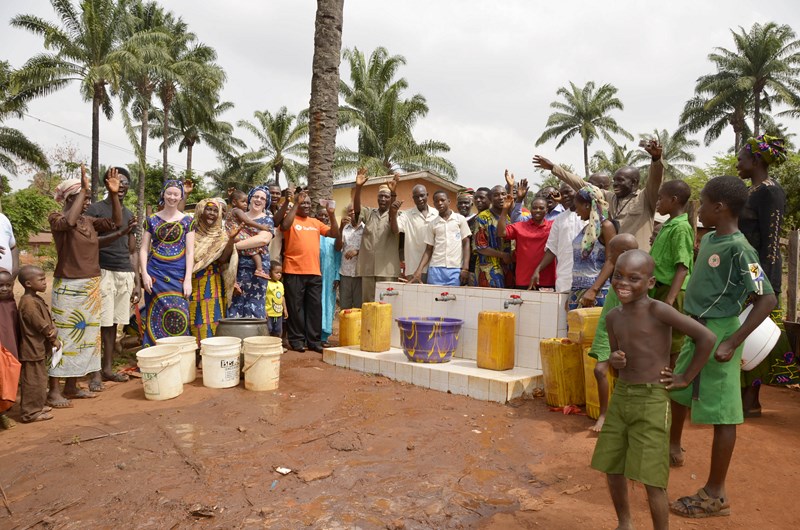
2010 Projects
Thanks for all your donations, sponsorship, and advertising towards our 2010-11 projects. We were able to donate a fantastic £70,000 to the following charities:
- Mission Africa - £16,000
- £7,500 to the wheelchair project.
- £1,500 towards toilets at Gyero farm and school.
- £7,000 for accommodation & water pipes at Ogugu.
- Second Sight - £13,500 (which equates to around 900 operations at Gems Hospital).
- Coaching 4 Christ - £8,750 to start the new school building.
- Emmanuel Hospitals - £15,000 for a new 20 bed maternity ward.
- McCord Hospital, Durban - £8,000 to upgrade the 21 bed maternity ward.
- Zoe Life, Durban - £8,750 for school classroom unit.
2010 - Zoë-Life
Zoë-Life specialises in addressing crucial areas of need, with a core focus on health (HIV, TB and malaria), child survival (infant feeding, nutrition, shelter and illness management), and family strengthening (psychosocial support and parental health). Zoë-Life operates from and in KwaZulu-Natal province, where the HIV and TB co-epidemic is most severe.
In conjunction with Westville Christian Fellowship, it hopes to embark on an ambitious project to build a church, a school and other multi purpose buldings in the Chesterville area of Durban, and funds from Radio Cracker will provide a classroom at the school. Find out more at their website - www.zoe-life.co.za
2010 - McCord Hospital
The renovations on Ward A2 begin in early 2011 thanks to donated funds from Radio Cracker and High Kirk Presbyterian Church in Northern Ireland. Ceilings are lowered, walls are painted, and floors are resurfaced.


July 2011: Leslie, Dave and Ken arrive onsite at McCord and commence their two-week renovation project: transforming what was originally three different office sites into what will become McCord’s brand new Baby Nursery!









On behalf of every McCord Hospital staff member and from every mother and baby to whom this project will make a huge difference for years to come, SIYABONGA (thank you). You have made a profound difference. Please keep in touch and come back to see the Maternity Ward completed and in action. With love, McCord staff and patients.
2010 - Emmanuel Hospital
Emmanuel Hospitals have been the beneficiaries of Radio Cracker funds for many years. Two years ago, thanks to Radio Cracker funds, Broadwell Christian Hospital was able to build new staff accommodation to replace the damp, cramped former building and last year funds helped to build a community clinic in Malawi. One of the alternative gifts available in the Radio Cracker shop is a mosquito net to help prevent malaria. For only £5, you can provide protection against this debilitating disease in Malawi.
This year Chinchpada Christian Hospital will receive money to build a new 20 bed maternity ward. Chinchpada Hospital, in Maharastra state, serves a mainly tribal community who are living a subsistence existence. They are some of the poorest people in India. The health and development indices of the area are among the worst in the country. 75% families live below the poverty line, 50 – 60% of girls are married before age 18yrs, female literacy is around 37% and maternal mortality is about 8 per every 100 live births. Tribal communities are unable to save for health care as what earnings they have are utilized for food and other basic needs.
Last year Chinchpada Hospital cared for 1,600 in-patients, 6,000 out-patients and conducted 200 deliveries and 400 surgeries. Over the years the hospital infrastructure, now 60 years old, has become run-down with, in places, severe fabric deterioration making conditions difficult for patients and staff and compromising hygiene and infection control. Some buildings are in urgent need of renovation and others have been repaired several times but renovating them to an acceptable standard is no longer viable or cost effective. Because the hospital caters for the very poor it does not have the capacity to pay for the upgrade of the hospital infrastructure. The team at Chinchpada are seeking support from outside the local community to help them improve the hospital and thereby its services.
You can find out more details on the Emmanuel Hospital website - www.eha-health.org
2010 - Coaching 4 Christ
In 2006 a team of Coaching4Christ volunteers travelled to Kisumu, Nyanza province, Kenya to outreach using soccer, to the young people in this area. Whilst there they met George and Hellen Ochieng, founders of the Vispa Emmanuel Christian Academy and Vision and Passion Orphanage. It was after meeting George and Hellen, seeing and working with the children and witnessing the conditions of the orphanage and school that hearts were stirred.
Coaching4Christ would like to support Vision and Passion to extend it’s work by helping them relocate the primary school and build a new secondary school and dormitories on a new site. The land has already been purchased for the project, and plans have been drawn up for the building work to commence.
One of the most important first steps in the project is the provision of a clean, fresh water supply, and last year, funds from Radio Cracker went towards the sinking of a borehole and construction of a large water storage tank. This will ensure enough water for the building work, and then a clean supply of uncontaminated water for the children and staff of the schools for drinking, washing and sanitation.
Hellen Ochieng was in Ballymena in early November this year, and she reported back to Radio Cracker the effect that the borehole has had – "I can hardly begin to describe the difference that this has already made to the area: the people of the Rabour area are saying it has brought the very presence of God back to our town. It has given us much hope for the future. We have also been able to dig a vegetable patch, and have already begun to grow our own vegetables. Please pass on our sincere thanks to all those involved in Radio Cracker for their compassion, love and faithfulness. We are so very thankful."
This year, Radio Cracker hopes to further support the work in Kenya by providing funds to start bulding the school on the site. Find out more at the Coaching for Christ website – www.coaching4christ.co.uk
2010 - Second Sight
In 2010, £13,500 was given to the charity “Second Sight” to carry out 900 cataract operations in India. Charity founder, Lucy Mathen, was in India in August 2010, and met one of the children who underwent an operation to get back his sight, and she was told by his teacher that he is now top of his class in school – a wonderful story of new hope for that young boy.
The man in this picture is 32year-old Dr Shiva, an eye surgeon living in the state of Orissa in India. The woman is ophthalmologist Dr Lucy Mathen from the London-based charity Second Sight. The boys are 9year-old Subala Suna and 12year-old Ranjit Bariha. Both were blind and had their sight restored by cataract surgery. Lucy met Dr Shiva and discovered that: - He had single-handedly cured 6,000 blind people in the past year - He had offered all the surgery free of charge - He took no salary and sleeps on the floor of his office - He works from 4.30am till midnight most days. Why?
Shiva comes from a poor family himself. So he has dedicated his life as an ophthalmologist to eradicating blindness from his home state...an area where up to half the population lives on less than 15pence a day. With his surgical skills he could be earning a fortune in one of India’s wealthy cities (where 80 per cent of eye surgeons work in private practice). Second Sight seeks out doctors like Dr Shiva who are actually curing the blind. Second Sight's own experienced volunteer surgeons also work alongside teams like Dr Shiva’s and cure the blind themselves.
Second Sight does not spend one penny of donated money on office costs. Second Sight is run by volunteers. So our money goes straight to the hospital where the operation is carried out, and in 2010 Radio Cracker supported Gems Hospital, an evangelical Christian hospital in India. Find out more about Second Sight at their website - www.secondsight.org.uk
2010 - Mission Africa
In 2010 Radio Cracker members Drew Robinson and Adrian Pogue visited some of the Mission Africa projects in Nigeria which have been supported in previous years, and they were most impressed by the way in which those donations were put to good use. In 2010 we were glad to be able to again support the wheelchair project in Jos for victims of polio with a £7,500 donation, and it was a very special morning when they visited the workshop where the wheelchairs were being made, and spoke with some of the men working there. Emmanuel, David and Edison are all victims of polio, and were busy putting together the bearings for the handlebars of the wheelchair when we arrived. Emmanuel was keen to explain how getting his wheelchair for the first time had transformed his life. He could now go to church, and go to work, providing an income for his family, and he wanted to make sure that we would bring his thanks to all those here in Ballymena who had made it possible for him and so many others to get a second start in life. In the afternoon, they attended the presentation of nine new wheelchairs to needy individuals.
Next day, was a visit to Gyero farm and school, bought with donations from Radio Cracker some years ago. Here, boys and girls are provided with an education and training in a trade which they can use to support themselves when they leave. Last year, money from Radio Cracker went towards the building of a dormitory on the Gyero site, and it is now up to roof level. In 2010 we were able to donate £1,500, which they hoped to use to bring water from the standpipe into all the buildings in the compound, and provide more toilet facilities for the children there.
Later in the trip they travelled down to Ogugu – over 8 hours by car south of Jos – to see some of the work being carried out by Mission Africa there. Advance is the name of the project run by Billy and Linda Abwa in the area looking after vulnerable children and people with HIV/Aids. Adrian and Drew witnessed the excellent work being carried out in the Donegore Centre in Ogugu – funded and supported by folk from 2nd Donegore church. There is an after school club, testing facilities for HIV/Aids, facilities for eye testing and provision of glasses where necessary, and they also have a sponsorship scheme for 96 children at present, which provides shelter, food, medicine and schooling for a child for just £10 per month, and there is a waiting list of over 160 other children. In 2010 we donated £7,000which will go towards completing some accommodation, pipe water from the proposed borehole in to the houses, and help support the children on the waiting list.
Further details of these and other Mission Africa projects can be found on their websites – www.missionafrica.org.uk www.advanceaction.org



